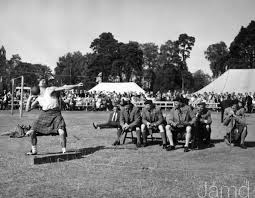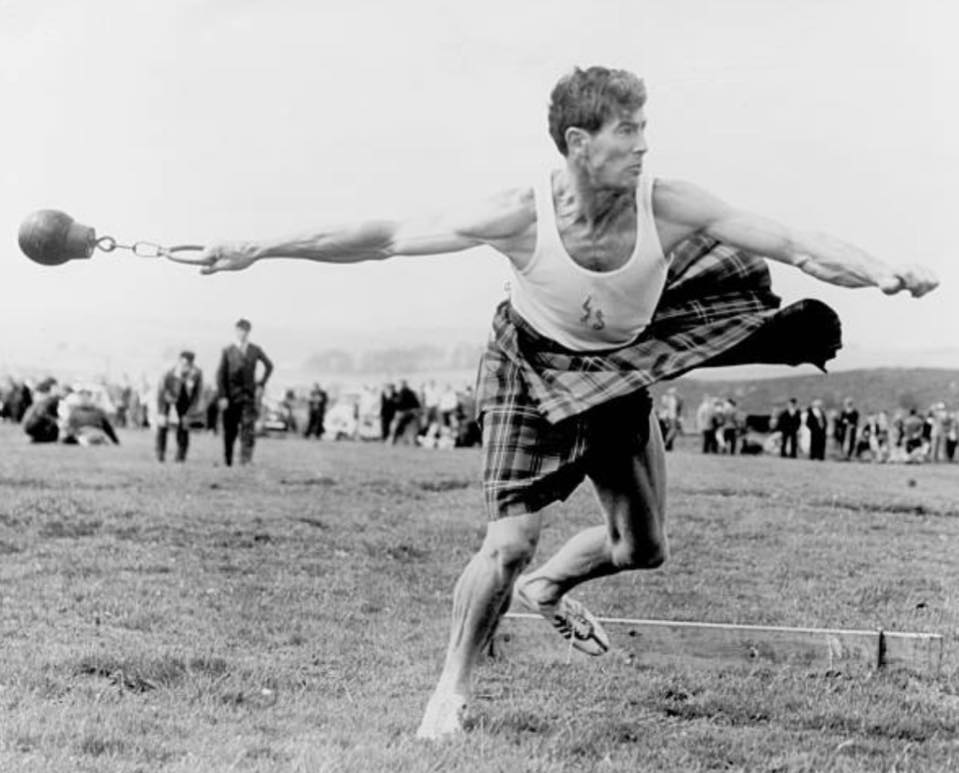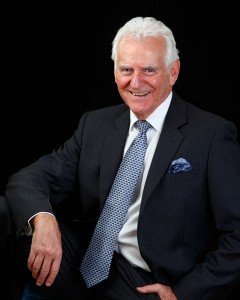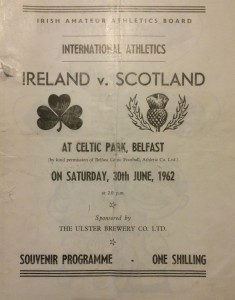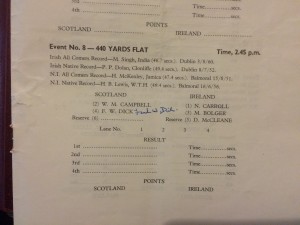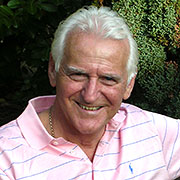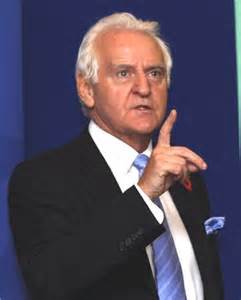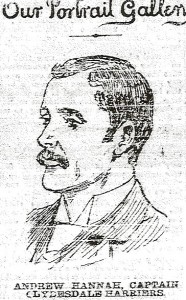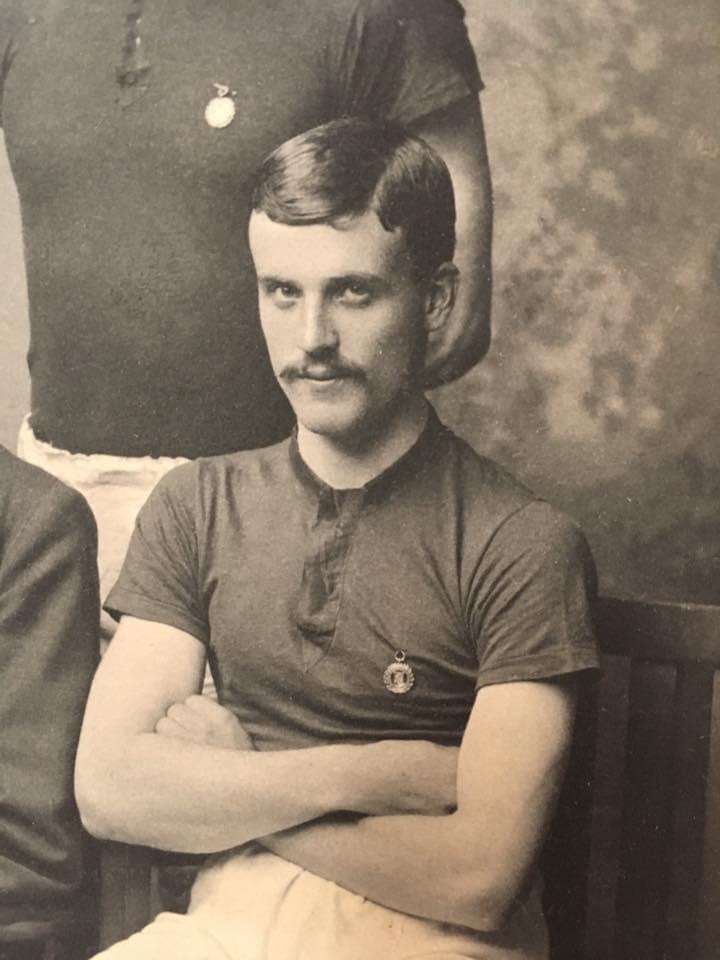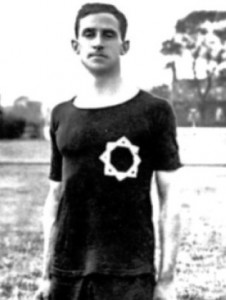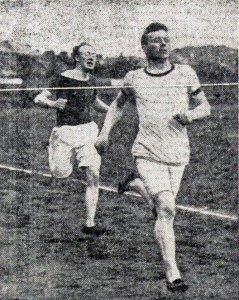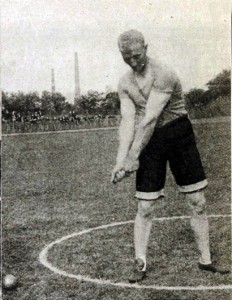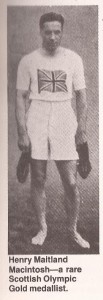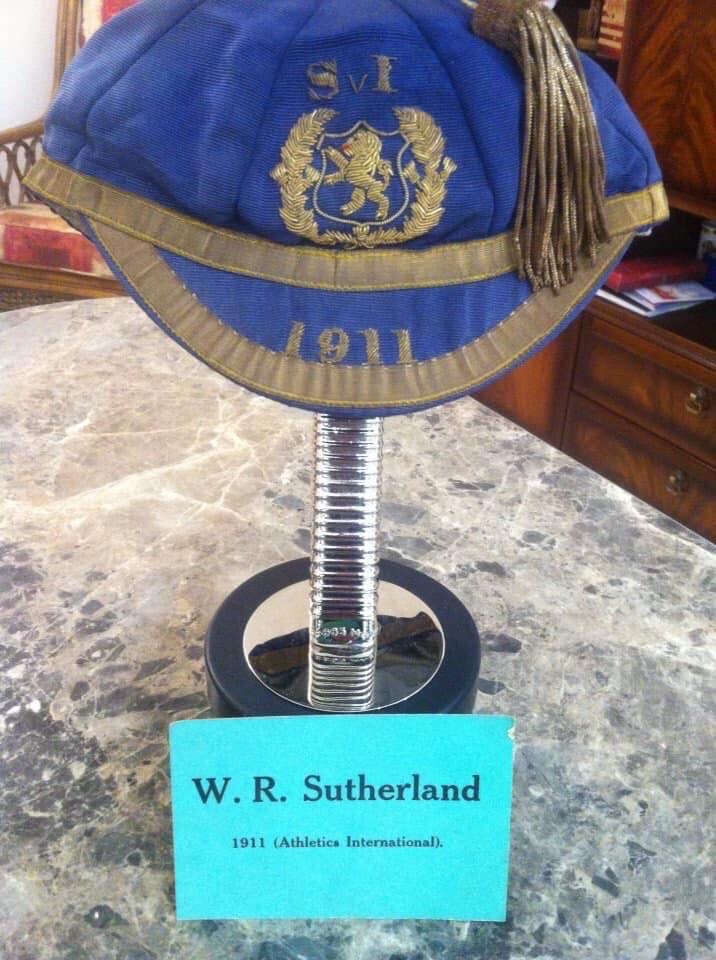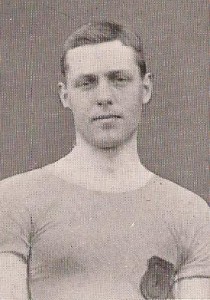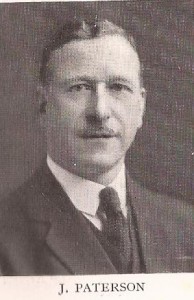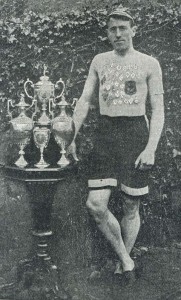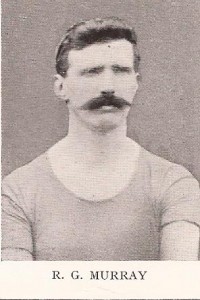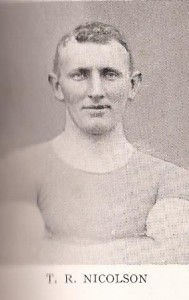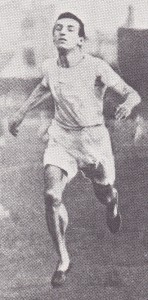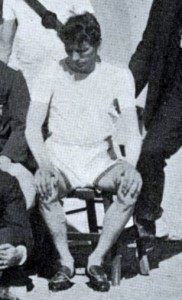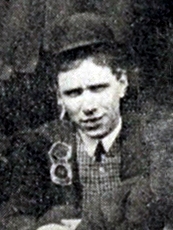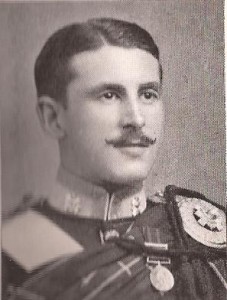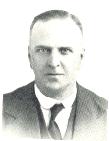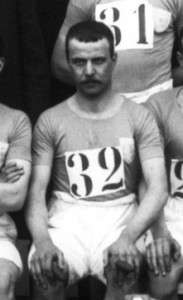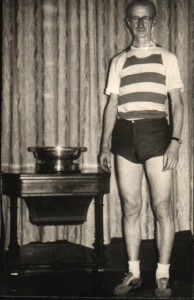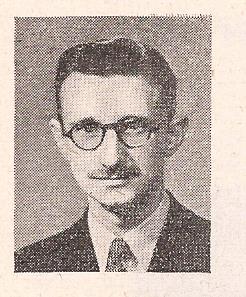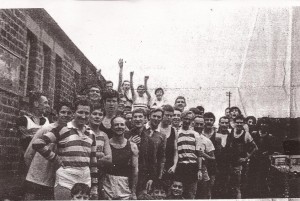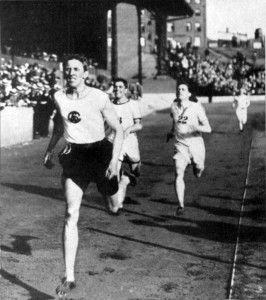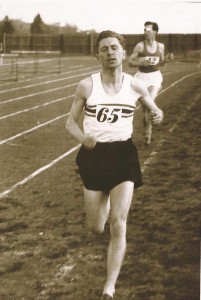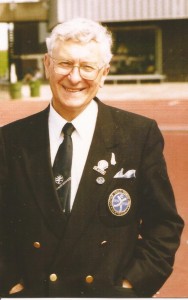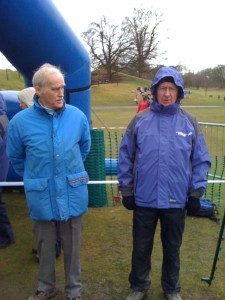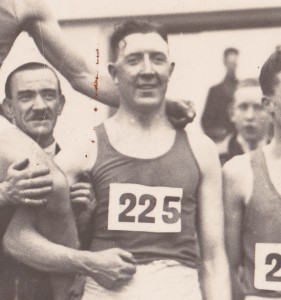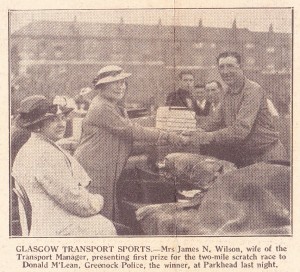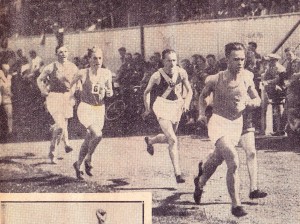John McGough – The Flying Postman
By Alex Wilson
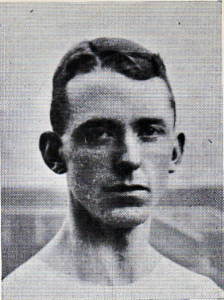
This excellent profile of one of Scotland’s best ever milers was written by Alex Wilson and must be the definitive coverage of the man’s career as an athlete. Alex also provided all the photographs, except for the 1907 AAA’s championship and the Olympic trial which are courtesy Kevin Kelly.
It’s almost an understatement to say that Celtic athletes were prominent in international track and field athletics in the late 19th and early 20th century. The names of Tom Conneff, Walter Newburn, John Flanagan, Paddy Ryan, Denis Horgan, Tom Kiely, Peter O’Connor, Tim Ahearne and the brothers Con and Pat Leahy are among the early Irish T&F greats who created world records and won Olympic medals across a range of events. Many more among the Irish diaspora competed with distinction under the flags of Great Britain, USA, Canada and South Africa. The Scoto-Irish middle distance runner John McGough is a classic example, a son of Erin fostered by the Scottish harrier system.
John McGough saw the light of day on January 20 1881 in the hamlet of Annagleve, a farming community located about two miles SSW of Castleblayney in County Monaghan. He was the eldest child of Thomas and Bridget McGough, who, to escape poverty, emigrated to Scotland and settled in Glasgow when McGough was an infant. McGough grew up in the Gorbals district, the heart of Glasgow’s Irish community, and later became the town postman. Little could Thomas and Bridget McGough have known that their boy would blossom into a wonderful athlete whom John W. Keddie described in “Scottish Athletics” as the “dominating force in Scottish middle distance running in the first decade of the new century”.
In a “Scots Athlete” piece entitled “A potted history of Bellahouston Harriers” by W.R. McNeillie it is gleaned that the club “was formed in 1892 in and around Govan, having as their earlier headquarters, Govan Baths, the nucleus of the club being postmen to whom it must have been just a quick step from walking to running.” As a postman, McGough had an important duty to discharge, letters being the principal means of long distance communication in the early 1900’s, as ordinary families couldn’t afford telephones. People expecting news would wait for the postman, who was easily recognisable by his navy blue uniform and peaked hat. A town postman had a lot of walking to do, covering at least ten miles a day and sometimes even double that, carrying a heavy mailbag slung over his shoulder or pushing a cart laden with parcels. The volume of mail in those days was such that a postman did several rounds a day, serving each household only once, and worked six days a week. “There is nothing like delivering letters on a long round for developing the leg muscles and producing real champions,“ said a Post Office official. “People sometimes claim that postmen are slow, but our list of record holders shows that in reality they are about the the speediest class of worker in the country. Postmen often claim that they walk thousands and thousands of miles in the course of their duties, and our list proves that they have speed as well as stamina. Healthy recreation was always encouraged in the Civil Service.” The list of famous G.P.O. athletes is a long one and, apart from John McGough, includes such names George Dunning, London G.P.O., the national cross country champion of 1881 and 1882 and long-time holder of the world 25 mile record; Bobby Bridge, the Chorley postman who broke every walking world record from eleven to sixteen miles in 1914; and Alf Shrubb, who was the postman at Horsham from 1901 to 1904 and broke every world record from 2000 yards to the hour.
In the early years the Bellahouston Harriers were solely a cross country club. Training was done work permitting and typically limited to a couple of runs a week through the Pollok estate from the Govan Baths in Summerton Road. The harriers did not hold their first summer championship until 1900, when the winner, according to McNeillie, was one J. McGough. A novice at the time, McGough won his first open race in July of the following year at the Clydesdale Harriers sports at the Exhibition Exhibition Sports Grounds in Gilmorehill. The Glasgow Herald reported that “a comparatively unknown man in J. McGough, Bellahouston Harriers, 40 yards, won the half mile”. The race brought out a big field and in the final heat McGough won by six yards from A. Grant, Edinburgh University, in 2:00.2. The following month, he was once again in the frame at the Celtic FC sports, where he finished second in the mile handicap off 60 yards. That season he won seven prizes, chiefly firsts. It was already clear that Bellahouston Harriers had an emerging star in their ranks.
McGough came out late in the season and was immediately successful, winning a two mile team race at the West of Scotland Harriers’ sports at Ibrox Park on 14th June in 9:54.6. A week later he caused a sensation by lifting both the one and four mile titles at the S.A.A.A. championships at Hampden Park on June 21st. The report in The Scotsman: “One mile – 1, J. McGough, Bellahouston Harriers; 2, W.H. Mill, West of Scotland Harriers. Three ran and W.R. McCreath made all the running. At the bell, however, McGough went to the front, and running away from his opponents, ultimately won by twenty yards. McCreath stopped 200 yards from the tape. Time, 4 mins 33 3-5 secs. Four miles – 1, J. McGough, Bellahouston Harriers; 2, A. Wright, Wellpark and Maryhill Harriers; 3, J. Ranken, Watson’s College A.C. Six turned out, and Ranken, McGough and Wright were left to finish. When the bell rang it was seen that the first-named had no chance of winning, and the other two went ahead together. A great race was ran between this pair. Wright, who was second to Mill last year, challenged the leader, but McGough stuck gamely to his advantage, and was a popular winner. Time, 20 mins. 51 3-5 secs.”
After claiming double gold in the Scottish championships McGough suddenly found himself running off scratch and heavily handicapped. That, however, did not deter him from winning the two miles flat handicap at the Clydesdale Harriers sports at Hampden Park on Thursday 26th June in 9:43.4, a time just two seconds shy of the Scottish native record.
As Scottish champion he was automatically selected by the S.A.A.A. General Committee to represent Scotland in both the mile and four miles in the annual international contest between Scotland and Ireland at Ballsbridge, Dublin, on July 19th. The contest, then in its eighth year, was the world’s first regular series of international matches and, at the time, the season highlight for both Irish and Scottish athletes alike. Scotland, the holders, were without several of their stars, notably Jack Paterson and Duncan Mill, winners respectively of the one mile and four miles in 1901, and found themselves on the receiving end of a 9-2 drubbing by the Irish. The running of McGough, beaten into second in both the mile and four miles by J.J. Daly, was symptomatic of the Scots’ overall showing. The Edinburgh Evening News: “Both these events were regarded as certainties for our youthful champion, J. McGough, and the defeat carried consternation into the Scottish camp. Daly’s sprinting of the last lap of the shorter distance took McGough completely by surprise. When Daly darted ahead at the bell, and prematurely took McGough’s ground, the latter made no effort to hold him, under the impression that the big Irishman would come back to him, but amidst wild “hurrors” from the spectators, Daly ran in a strong winner by twenty-five yards in 4 min. 27 4-5 sec., a time which nobody deemed him capable of. He is one of the ugliest runners we ever saw, lurching along with giant strides, but “handsome is as handsome does” all the world over, and Daly must rank as one of the best milers Ireland has yet produced. In the four miles McGough was looked upon as likely to turn the tables, and excitement rose to a high pitch when the pair alone remained on the track with half a mile to go. In the back straight of the second last lap McGough on the inside made an attempt to draw away, whereupon Daly swooped down upon him, and fouled him so badly as to cause him to reel. Before McGough recovered Daly was 20 yards in front, but with a great effort McGough began to close up the gap 300 yards from home. At the foot of the straight Daly was palpably in extremis, but try as McGough liked he was still three yards to the bad when the Irishman broke the worsted in 20 min. 42 3-5 secs. McGough was distinctly unlucky to lose, and on a cinder track we are confident that he would beat the Irish champion. The last mile was run in 5 min. 0 2-5 secs., and the intermediate mile times were: one mile, 5 min. 3 1-5 secs., two 10 min. 24 2-5 secs., three 15 min. 42 1-5 secs.”
A fortnight later, in a meeting at Barrhead, one of many that had to be postponed that summer due to the Coronation of King Edward, McGough delivered one of the best performances of the day in the half mile handicap off 8 yards. “He ran as he always does, with rare judgement, and it goes without saying that his triumph was well received,“ the report read.
At the Celtic FC sports the following Saturday he produced another excellent performance in the mile handicap in front of a bumper crowd of 25,000 spectators. The race fell to A. Duncan, of the Olympic Harriers, 120 yards, in 4:21. McGough just failed to get up to win the race, but managed to get the better of his Irish rival Daly, both men running from 40 yards, the one getting second and the other third.
Thus concluded a season in which McGough had gone from being a relative unknown to the new face of Scottish athletics. In all, he added 19 prizes to his trophy cabinet. More importantly, from a broader perspective, he was the only Scottish middle distance runner then who was capable of filling the big boots left by Jack Paterson and Duncan Mill. Even though still in the early stages of his athletic career, he was, it seemed, carrying not only the mail but also the hopes of a nation on his shoulders.
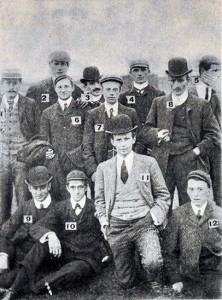
At Celtic Sports, 1902: McGough 12, Joe Binks 7, Rimmer 9, Daly 5
A winter of stamina-building pack runs and inter-club runs saw McGough emerge from the winter of 1902/3 an improved athlete. He kicked off his track season at Parkhead on May 11th at the annual sports of the North Cycling and Motoring Club, where he won the half mile handicap off 8 yards. “In the half mile flat handicap,” reported the Glasgow Herald, “J. McGough, Bellahouston Harriers, ran splendidly getting through about 40 runners, and winning easily. Time: 2 min. 2 3-5 sec.“
A few days later he was matched against fellow Scoto-Irishman Pat McCafferty over four miles in the West of Scotland Harriers sports held at Ibrox Park on Thursday 14 May. It wasn’t much of a contest, though, because McCafferty retired at two miles and McGough finished alone. His time of 20:21.8 was another personal best and brought him to within 11 seconds of the Scottish native record.
Four days after that, McGough tested himself against English cracks Sid Robinson, Northampton, and Jack Rimmer, Southport, in a two miles handicap at the Glasgow Merchants Cycling Club sports at Parkhead. In view of his good early season form, it’s maybe a little surprising that he was given an 80 yard start on his English rivals, who were the backmarkers. Not surprisingly, neither Robinson nor Rimmer figured prominently, while McGough cut through the field like a hot knife through butter and came home the winner by 15 yards in 9:26.4. As was a common practice in those days, it had been arranged that the Bellahouston Harrier would run on for another 80 yards to complete the full distance. His time of 9:37.0 was a new Scottish native record, four seconds inside the old figures that had been held by Andrew Hannah, Clydesdale Harriers, since 1894. “Record breaking,” wrote a Herald columnist, was an “infallible test of athletic excellence”
His appetite for record-breaking whetted after making his first incursion into the record books, McGough then set his sights on the three miles native record – 14:57.2 by William Robertson, of Clydesdale Harriers – in a handicap race at the Edinburgh Harriers sports at Powderhall Grounds on June 6th. The report read: “This was one of the tit bits which the promoters of the sports had arranged. Additional interest was added to it by the appearance of Daly and McGough at scratch. The entries numbered twenty-seven, and twenty-one competed. The absence of P.J. McCafferty, W.S.H. (125 yards) and W. Robertson, C.H. (140 yards) was regrettable, as between them and the scratch men a good race was expected. For some time neither of the scratch men made much ground, but as some of the competitors with the large starts dropped off and the field was thinned, they began to draw in the remaining men. With five laps to go, after having covered seven, Daly dropped off, but McGough held on his course. It was unfortunate that he got no assistance in the way of pacing. Many of the runners dropped off, leaving him to cover the large gap between him and those with the big starts. If he had had a strong runner in front of him he certainly would have made a great show, as he finished only 4-5th secs. outside record time. The winner finished apparently fresh after a sprint for the tape. McGough on coming into the straight was loudly cheered for his sprint home. His time was 14 mins. 58 secs.” Clearly the record was at McGough’s mercy, given good conditions and a good race.
Next on the agenda was the S.A.A.A. championships at Ibrox Park on June 20th, when the main feature was McGough’s bold attempt to pull off an unprecedented triple in the half mile, mile and four miles. The Edinburgh Evening News takes up the story: “Hugh Welsh was the first man to win both the half mile and the mile, a feat he accomplished in 1896, ’97 and ’99. His ambition, unfortunately, did not turn in the direction of triple honours. J. Paterson, who began as the four miles champion, and worked down to the lesser distances, in 1900 won the half mile and mile, and he might have forestalled McGough had he possessed the stamina of the Bellahouston man. Paterson was actually a three distance champion in 1900, he having won the ten miles championship in April, but it has been reserved for McGough to be the first to win three distance races in one day. He was fortunate in the respect that he had his easiest undertaking first; had Cowe met him at four miles after a gruelling mile, the chances are that the Berwick man would have been champion instead of runner-up. But McGough well deserved his laurels. He beat a prettier runner in Roxburgh over half a mile in the capital time of 2 min. 1 3-5 sec., in the mile he pulled out Ranken and made the Watsonian do the best time of his career – as a matter of fact, Ranken’s 4 min. 30 1-5 sec. has only two or three times been beaten in the championship – and in the last race of the day he wore down a strong and plucky runner in J.B. Cowe, winning in 20 min. 30 1-5 sec., the fastest time on record in an S.A.A.A. championship, and not 20 sec. outside Duffus’ Scottish “native” record time for the distance in the S.A.A.U. championships of 1896. The times alone stamp McGough as one of the greatest runners we have ever had in Scotland. He was in distress in one portion of of his race with Cowe, who has a lot to learn in the matter of tactics, but in each case his strong sprint pulled him through, and his capabilities were not bottomed at any distance on Saturday.”
The feat of winning all the distance events at a single one-day championship is one of such singular difficulty, it has never been repeated since. McGough being postman, it was of course a red letter day in the annals of S.A.A.A. history. Here is the account of all three races as published in The Scotsman:
Half mile: 1, John McGough (Bellahouston Harriers); 2, William Roxburgh (Hamilton Harriers). The winner went to the front from the crack of the pistol and was never overtaken. Roxburgh made his effort coming round the last bend, by which time Smith had dropped well out of the race, but McGough shook off the challenger, and, finishing strongly, won by about eight yards. Time 2 mins. 1 3-5 secs. One Mile: 1, John McGough (Bellahouston Harriers); 2, John Ranken (Watson’s College A.C. and Edinburgh Harriers). McGough won the second championship in easy fashion by about a dozen yards in the good time of 4 mins. 27 3-5 secs. The lap times were 66 1-5 secs., 2 mins. 15 ½ secs., 3 mins 24 1-5 secs. Four Miles: 1, John McGough (Bellahouston Harriers); 2, James B. Cowe (Berwick Harriers). J. Ranken dropped out with a mile gone in 4 mins 55 4-5 secs., and Robertson retired at two miles, which took 10 mins. 5 3-5 secs. McGough was leading when three miles had been covered in 15 mins. 23 secs. With two and a half laps to go, Cowe went away with a spurt, and it looked for a minute or two as if the champion was going to give in, but he soon pulled up and took the lead again. With the ringing of the bell McGough forced the pace, and it was at once seen that Cowe could not finish like a champion, and continuing to go strongly round the last lap, amid enthusiastic cheering, McGough won his third championship of the day by about twenty yards. Time 20 mins 30 15 secs.
The S.A.A.A. entered McGough for the A.A.A. championships at Northampton on Saturday 4th July. In his first event, the half mile, he made the mistake of trying to win from gun to tape, for despite his best efforts, he was unable to get away from experienced campaigners Bert Blunden and Albert Barker, and ultimately ran himself to a standstill, giving up 200 yards from the finish. He was also entered for the mile, which the peerless Alf Shrubb won easily in 4:24.0, but heeded the advice of his friends to “stand down”.
He was selected for both the half mile and the mile in the Scoto-Irish contest at Powderhall on July 18th. The half mile was one of the doubtful events, for he was up against Irish speed merchant James Finnegan, winner of the half mile in the previous two encounters. However, McGough left very little hope for the Irishman by going away at a cracking pace and, leading from start to finish, won by ten yards in 2:03.4, a good time considering the sodden track and bleak and miserable weather. The mile was a more tactical affair, in which McGough avenged his previous year’s defeat at the hands of J.J. Daly, powering through a 61 sec. last quarter to win by 12 yards from the burly Irishman. Overall, though, Scotland lacked the strength in depth, and again Irish eyes were smiling when they retained the team contest.
On Wednesday 22nd July McGough made another appearance in Edinburgh, in the Leith Shamrock Cycling Club sports at the Hawkhill Ground. Alongside the American sprint ace, Arthur Duffey, he was the main attraction of the evening. Running from scratch in the mile handicap, he threaded his way through a big field, and was cheered home the winner by eight yards in a new personal best of 4:26.6.
In Rangers F.C. sports at Ibrox Park on Saturday 1st August he ran in the mile handicap. A big crowd of 12,000 spectators cheered as worked his way up through the field and got up to second, six yards short of catching W. Watson, Edinburgh Southern (80 y), in 4:28.4. When the meeting continued on a wet and cold Monday evening the Scottish champion started from the scratch mark in the two miles handicap, and, taking the lead after 1 ¼ miles, breasted the tape in a new Scottish native record of 9:36.4, three-fifths of a second inside his own figures.
He concluded his track season a week later at the Celtic F.C. sports, but did not have the freshness in his legs needed to make up some big starts in a field of 53 runners and retired before the finish. “McGough,” wrote the Glasgow Herald, ”made a plucky effort to get through the labyrinth of competitors, but did not succeed, and he, along with J. Daly, the Irish crack, gave up on entering the finishing straight.“ Handicaps with large fields, were great crowd entertainment, but had their obvious drawbacks for the backmarkers, who were additionally handicapped by the sheer weight of numbers, being forced to constantly dodge and weave through slower runners and run wide on the bends and in the straights.
Thus ended a memorable season during which he had amassed 24 prizes and created S.A.A.A. championship history by winning all three distance titles in one day, not to mention scoring a “double” in the Scoto-Irish contest and setting a couple of native records.
1904 season
McGough was no cross country runner and derived little pleasure from heavy going or ploughed fields. Bearing this in mind, he showed loyalty beyond the call of duty by turning out for his club in the 1904 Scottish Cross Country Championships at the Agricultural Grounds, Scotstoun. After leading in the early stages, said the report, he slipped down the field upon entering the open country and, though we don’t know his finishing position, he presumably finished well down the order. However, the work he put in during the winter showed when he opened his track 1904 campaign with a bang in the West of Scotland Harriers sports at Ibrox Park on Saturday 21st May. The meeting was actually a team competition for the Connell Cup, and four teams took part, including the ultimate winners, South London Harriers. One of the highlights of the meeting was the appearance in the one and three miles of English champion Alfred Shrubb, who had only just recently smashed the world five mile record. The neatly moustached Englishman had swept all before him since 1902, but had yet to make acquaintance with the Glasgow postman, who, after finishing runner-up to E.H. Montague (SLH) in the half mile, faced Shrubb in the mile. “The mile was a specially interesting race, in which the respective champions of Scotland and England fought out the issue. Going off at a fast pace – the first quarter was covered in 58 sec. – Shrubb speedily scattered the field, and at mid distance only the Scotch champion remained seriously to consider. Drawing slowly on the South Londoner, the Scot closed up the gap, and the pair ran stride for stride till 300 yards from home. Then a ding-dong finish was witnessed, lasting round the final bend and into the straight, where McGough gained an advantage, which attended him to the tape. Shrubb ten yards from the tape easing up, seeing pursuit hopeless. Shrubb was beaten by two yards in 4 min. 26 sec., and the merit of McGough’s win all the greater because prior to the mile McGough had run a close second in a scratch half mile to E.H. Montague, a club-mate of Shrubb’s.” McGough’s victory over the indomitable Shrubb was, of course, something of a novelty and, wrote The Scotsman, caused “a scene of excitement which is seldom witnessed at an athletic meeting in Glasgow.” The Glasgow Herald: “Some have it that the Scottish champion does not always show sound judgement, but, be that as it may, he gave a flawless display on Saturday.”
When the meeting continued on the Monday, McGough turned out in the three mile handicap against Shrubb, amongst others, and served up the highlight of the evening by knocking more than 13 seconds off the Scottish native record. In spite of running such an impressive time, bad handicapping saw him finish unplaced, the winner being J.R. Moffatt, of Larkhall Harriers, who with the benefit of a liberal 450 yards start broke the tape in the then fanciful time of 14:12.4. The Scotsman reported: “A. Shrubb, English champion, was at scratch, and the handicap was framed with a view to record-breaking. The Englishman, however, gained nothing on McGough after the first half mile, and retired after running two miles. McGough, who ran in rare style, maintained a steady pace throughout, and although only fourth in the handicap, completed the full distance in 14 mins. 44 3-5 secs.” Shrubb, who had also run the three miles at the Saturday meeting in 14:59.4, was clearly not at his best and stale from his heavy racing schedule, but this does not in any way diminish the quality of McGough’s performance, particularly when it is considered that the three miles was a distance he rarely attempted.
McGough was among the entries for the 1000 yards handicap at the Clydesdale Harriers sports on Saturday 28 May, but was called upon to give 57 yards to S. Carson, and this task was five yards too much for him. He ran fairly well, but could do no better than 2:21.4. The following week, at the annual athletic gathering of the Edinburgh Harriers at Powderhall Grounds, he was in better fettle, breaking the two minute barrier in the half mile for the first time with a time of 1:59.6. Being rather heavily handicapped, however, he was unable to get among the first three, William D. Anderson, of Olympic Harriers, winning off 20 yards in 1:58.0. Later in the same afternoon, he turned out in the two mile handicap where, despite a sterling 9:41.4 performance, he was unable to get anywhere near the leaders, Sam Stevenson, Clydesdale Harriers, taking advantage of a 180 yard allowance to win comfortably in 9:22.0.
On June 11th he again confronted Alf Shrubb in a mile handicap at the West of Scotland Harriers meeting at Ibrox Park, where earlier in the afternoon the Londoner had electrified the crowd by smashing the world two mile record to win in 9:09.6. In spite of his exertions, the Englishman conceded McGough 15 yards in the mile. It proved to be a great race, McGough and Shrubb running neck and neck on the last lap. Then the Englishman edged ahead in the home straight and won by a yard amid tumultuous scenes with the clock stopping at 4:23.8.
McGough was conspicuous by his absence when the meeting resumed on the Monday evening, when, once again, the undisputed star of the show was Alf Shrubb, who served up a world four mile record of 19:23.4. In spite of the record-breaking exploits of Alf Shrubb and his face-off with John McGough at the Saturday function, the overall attendance at both meetings was disappointing (a mere 6,000).
A fortnight later McGough had no difficulty in retaining his half mile and mile titles in the S.A.A.A. championships at Powderhall Ground, the former by a couple of yards from William Anderson in 2:01.8 and the latter by 30 yards from Sam Kennedy, Garscube Harriers, in 4:36.4. By winning the mile for the third time McGough made the 25 guinea silver challenge cup his to keep. To be allowed to keep an S.A.A.A. challenge cup in any event, you had to win the title either three times in succession or four times in total.
On July 2nd McGough renewed his rivalry with Alf Shrubb in the mile flat race at the A.A.A. championships at Rochdale. Shrubb, as expected, took the lead early on and, setting a fast pace considering the stormy weather, held it until 300 yard from home, when Joe Binks, the British record holder, went ahead. Shrubb, however, came again, and won a desperately close race by a yard, just managing to hold off McGough, whose late charge carried him past Binks and into the silver medal position. McGough’s time of 4:22.2 was faster than he had ever previously run in public and some consolation for narrowly failing to win this, the blue riband event. Among Scots (amateurs), only Hugh Welsh had run faster. In 1906 Shrubb would describe this race as the hardest battle he had ever had.
Fresh from his medal-winning run in the A.A.A. championships, McGough took full advantage of favourable weather and track conditions at the Bellahouston Harriers sports at Ibrox Park on Saturday 9 July to erase not one, but two, Scottish native bests from the record books. Running from scratch, he finished fourth in the 1000 yards handicap, recording a personal best of in 2:18.8 – a 1.2 sec. improvement on the previous figures for the distance which had stood to the credit of James Rodger, of Maybole, since 1895. Later in the afternoon he turned out in the two miles handicap, and, taking the lead with a lap to go, stretched away to win comfortably in a time of 9:36.0, four tenths of a second inside his own figures. The setting of two native records in two separate distance races in the space of a single afternoon was a Shrubb-esque feat and, accordingly, the Glasgow Herald’s editorial reads like a laudatio: “It is not too much to say that John McGough has made the Bellahouston Harriers. For years he has taken a great pride in the club, and in turn the members have taken a great pride in him. By his brilliant achievements he has given Bellahouston Harriers a name which is now a household word in athletic circles everywhere, and that name he enhanced on Saturday , on the occasion of their first open sports, by creating two fresh records in the 1000 yards and the two miles, taking 1 1-5 off the former and 2-5 sec. off the latter. He was the winner of the longer distance, but in the 1000 yards he was unplaced , which is to be regretted, as his running was worthy of being crowned with first honours. McGough is an extraordinarily fine runner ; as a matter of fact, he comes next to Hugh Welsh, of the Watsonians, whose running must still be fresh in the minds of many.”
The record-breaking double at Ibrox obviously augured well for the annual Scoto-Irish contest, held a week later at Ulster Cricket Club, Belfast, where, as Scottish champion, McGough was nominated for the half mile and the mile. The weather was fine and there was a large attendance, but the playing field was anything but level, literally, and so not conducive to fast running. In the half mile McGough looked to have the trace sewn up, but was denied when Ireland’s James McKenzie came with a storming late run to win by four yards in 2:03.6. However, he made amends in the mile, which he won easily from Ireland’s Michael Hynan in 4:27.6. Once again, though, Scotland lost the contest with only four wins to Ireland’s seven.
After the international match McGough continued to show good form throughout the remainder of July and August, when the big sports meetings of Glasgow Rangers FC and Celtic FC traditionally rounded off the season, even if the handicappers were not on his side. In the Edinburgh Northern Harriers’ sports at Powderhall Ground on July 30th he was too heavily handicapped to have any hope of winning the half mile from scratch, and first prize went to John Clelland, of Edinburgh Harriers, 50 yards, in 1:57.0. Despite running two minutes dead, fifth place was the best he could do. His next engagement was in the Rangers sports on Saturday 6 August, when 12,000 spectators turned out in uninviting weather and were rewarded with some excellent T&F fare including a record hammer throw of 51.71 metres by Tom Nicholson and a popular evens win for James P. Stark, of the West of Scotland Harriers, in the 100 yards handicap off 2 ½ yards. McGough was running in the mile, the final event on the programme, and again conceded some formidable starts to his fellow competitors including 15 yards to Darlington’s George Butterfield, whom he had only just managed to beat in the A.A.A. mile. He got into frame by finishing third, but was unable to do anything about Butterfield, who gleefully sprinted to victory in 4:24.2, more than making up for his 15 yard start in the process. McGough returned to Ibrox on the Monday evening, when he again he faced Butterfield in the two miles handicap, both men running from scratch on this occasion, and the 6,000 spectators witnessed a terrific race. Butterfield ran magnificently, sprinting away from McGough a furlong from home to win by fully ten yards from A. Wright, of the Wellpark Harriers, in 9:28.4. There was a separate watch on McGough, who in finishing third was timed at 9:32.4, an improvement of 2.6 seconds on his own native record.
McGough ran his last race of the season five days later at the last important athletic meeting of the Scottish season, the annual sports of the Celtic Football Club at Parkhead. The sky was overcast, and during the progress of the sports there was occasional showers. Notwithstanding the weather there were 20,000 spectators present, which was the biggest attendance of all the fixtures held that season. In the one mile handicap, Wright of Wellpark Harriers took full advantage of a 55 yard allowance to win a close contest in 4:23.4. However, the interest in this race centred chiefly around the scratch men McGough and Butterfield. Towards the end of the race McGough left the Englishman several yards behind and it looked like he was going to avenge his earlier defeats. With an astonishing sprint, however, Butterfield overtook McGough ten yards from the line and finished a yard in front, both men clocking 4:25.
Thus ended another fine season in which there had been little to fault, save for a tactical error that cost him victory in the A.A.A. mile championship. Earlier in the season he had run his best race to date when he showed English distance-running maestro Alf Shrubb a clear pair of heels in the mile at the West of Scotland Harriers sports. He had defended his Scottish half mile and mile titles, and, by winning the latter for the third time in a row, had claimed the valuable silver challenge cup. He had also defended his mile crown in the Scoto-Irish contest. And, most importantly, he had shown continued improvement by setting a string of personal bests and Scottish native records over distances from 1000 yards to three miles. He had gained 26 prizes in all, this being made of 10 firsts, 12 seconds and 4 thirds. It was all good stuff, but the best was yet to come.
McGough kicked off his 1905 campaign with a four miles match against Hugh Muldoon in a sports gathering at Belfast on May 20th, winning by 20 yards in 21:12.4. This he followed a fortnight later with a double start in the Edinburgh Harriers sports at Powderhall, where he took second in the 1000 yards handicap in 2:23.4 before carving up the field to win the two miles in 9:37.0. A 4:30.4 handicap mile victory at the Edinburgh Pharmacy AC sports on June 7th and a 9:43.0 win in the two miles team race at the West of Scotland Harriers meeting at Ibrox Park on June 10th set him up nicely for an attack on the Scottish 1000 yards record at Ibrox on the Monday evening. The weather was good, but a strong wind prevailed. He set off in good style and, running strongly, made up all the handicaps and broke the tape first in a time of 2:18.2, which bettered his own Scottish native record by six tenths of a second. McGough‘s “fine running was the feature of the meeting”, said the Herald.
The following weekend, he scored the easiest of wins in the one mile handicap at the Bellahouston Harriers sports at Ibrox Park in 4:24.2. This was a perfect tune-up for the twenty-third S.A.A.A. championships held at the same venue on June 24th in fine weather. The attendance at the national championships, however, was disappointing, and not more than 2000 people were present. But if the number of spectators was small, the sport was of the highest order. One native record was broken, this being in the half mile. It was also one of the best races of the day. In addition to McGough himself, it featured that peerless Army runner Wyndham Halswelle and William D. Anderson, now a fellow Bellahouston Harrier having switched his allegiances from Olympic Harriers. The pace was fast as W. Roxburgh (W.S.H.) led the field through the quarter in 58.8 sec., and the finish culmimated in a “magnificent struggle” with Anderson just getting home ahead of McGough in a new native record time of 1:58.8. By so doing Anderson was eligible for a second, special gold medal, in addition to the winner’s gold medal. McGough finished a mere yard adrift, recording a personal best of 1:59.0, and Wyndham Halswelle was two yards behind McGough with 1:59.4. It was the first time in championship history that the first three men had finished inside 2 mins. Sadly, the mile championship took place in the absence of Charles Henderson-Hamilton. The Edinburgh-born Oxford University student, who had won the mile in the varsity match on 31st March in a sensational 4:17.8, was unavailable as he was reading for his Army exams. John Ranken, Watson’s College AC, took on the pace-making duties and led until a furlong from home, when McGough accelerated away to win title No. 4 by fourteen yards in 4:24.2. In his wake, fast times were returned by A.M. Matthews, Edinburgh University AC, second in 4:27.4; and Ranken, third in 4:28.0.
July was just around the corner again, and that traditionally began with the A.A.A. championships. On Friday week McGough travelled south to Stamford Bridge in hopes of making amends for his narrow defeat at the hands of Alf Shrubb in the mile a year earlier. He was still smarting over the tactical blunder that, he believed, had cost him the title. This year, at least, there was no Shrubb to contend with; he had pulled out of the mile rather than confront McGough and Butterfield. “It is no use killing myself,” was his eloquent argument. Nevertheless, a strong field of eleven runners lined up in sunny weather. First George Butterfield and then Joe Deakin, of Herne Hill Harriers, set the pace. James Roberts, of Sefton Harriers, went ahead in the third lap, and at the bell it was Roberts leading, followed by Butterfield and McGough. So it remained until halfway round the final bend, when Butterfield showed what a brilliant tactician he was by suddenly hustling past Roberts and streaking to victory by four yards in 4:25.2. McGough immediately gave chase, but he could not close the gap, and for the second year in a row he finished runner-up in the British championship.
A week later, McGough put in an appearance at the St. Bernard’s F.C. sports at the Gymnasium Grounds, Edinburgh, where he was the main attraction alongside Wyndam Halswelle, who stirred up the 2,000 strong crowd with a 32.6 sec. victory in the 300 yards handicap off 2 yards. McGough turned out in the mile, in which 26 ran, conceding starts up to 125 yards. He also gave spectators something to cheer about as he gradually reeled in all his opponents, producing a grandstand finish to get home first by a yard in 4:25.2. Earlier in the day, there had been skullduggery afoot in the heats of the 120 yards handicap, where one of the competitors, looking to set himself up for a big win in the final, was disqualified for running with lead weights sewn into the soles of his spikes.
After collecting his silverware, he hurried back to Glasgow to catch the mail steamer from Greenock to Belfast, where he competed next day in the one mile handicap and in the three miles championship of the Gaelic Athletic Association, the G.A.A. being the older of Ireland’s two rival governing bodies. In the latter event, he defeated Hugh Muldoon by 20 yards to win his first Irish title, albeit in a slow time of 16:18.8.
The Emerald Isle clearly had a special place in McGough’s heart as witnessed by his affiliation to the G.A.A., and the fact that he aspired to winning titles not only in Scotland and England, but now, also, in his country of birth. There was, however, never any question of him switching his allegiance to Ireland at this time, and he dutifully turned out in the colours of Scotland in its encounter against Ireland at Powderhall Grounds on July 15th.
The meeting took place in the presence of 5,000 spectators and ended in a very decisive victory for the Scots, by eight points to three. “A feature of the day’s sport,” wrote The Scotsman, “was the running of the new quarter mile champion, Lieutenant Halswell, and J. McGough, who won the quarter and the mile respectively very comfortably from their Irish opponents.” As to the actual race, “A.M. Matthews, Edinburgh University, paced the champion for the first two laps, with the Irishmen in very close company, and at the third round McGough assumed the lead. On the last lap, G.N. Morphy, Dublin, challenged McGough, and led him five yards at the bend. McGough, however, came up the straight in great style, and won by a yard and a half, J. Fairbairn-Crawford, M.C.C., and Matthews being half a dozen yards behind.” The weather was fair, but the presence of a fairly stiff breeze showed its effect on the time sheets, which credited McGough with 4:30.2.
A fortnight later McGough was once again headed south where he would be representing his employer in the inaugural British Postal Service championships. The event was promoted by the St. Martin’s (G.P.O.) Harriers and held at Putney Velodrome and attended by athletes from postal services throughout the United Kingdom. McGough was the class act in an otherwise modestly contested meeting where the showcase event was the mile championship for a gold medal and the Dewar Challenge Shield presented by Sir Thomas Robert Dewar, M.P., the name behind the world-famous Scottish whisky and a leading sporting patron. After comfortably winning this in 4:36.6, McGough ran the last leg for his team (Glasgow P.O.) in the inter-office relay race and left his opponents standing, winning by 80 yards.
“Alfred Shrubb doubly defeated” “run off his legs”
Racing in London on the Saturday might not have been the ideal preparation for his next engagement, the West of Scotland Harriers’ sports at Ibrox Park on Monday 31st July, but McGough possessed surprising recuperative powers. The preview in that day’s edition of the Glasgow Herald read: “J. McGough may not be at his best, as he has travelled from London overnight, but he is a runner of great resource, and rarely fails to give a good account of himself on the Rangers ground.” This assessment was to prove dead on. The principal event of the evening was a three-way mile and a half scratch race between Alf Shrubb, the English ex-champion in the mile, George Butterfield, the present mile champion of England, and McGough, the Scottish mile champion. F.J. Spencer, South London Harriers, also took part, presumably as a pacemaker, and led for the first quarter of a mile, which he covered in 59 sec. He then retired leaving Shrubb first, Butterfield second, and McGough third. In this order they passed the half mile post (2:09.0), three-quarters of a mile (3:22.6), mile (4:37.0) and mile and a quarter (5:49.6). Then the real racing began. “When the bell rang for the last lap”, reported the Herald, “half a yard covered the three competitors. Three hundred yards from home McGough got up on Shrubb, and then Butterfield came away. A hundred yards from the post the three men were abreast of each other. Butterfield was the first to show in front, but McGough made a splendid effort, and a magnificent race took place between the two men, the Scottish champion winning by inches, with Shrubb fully two yards behind. McGough had a flattering reception on retiring to the pavilion. Time: 6 min. 52 3-5 sec.” It was a brilliant piece of tactical running against two of the world’s pre-eminent runners, and possibly his single best race to date. The Herald: “McGough…came out as a tactician in this race, which is rather a new role for him.” Another paper described the race as “one of the finest seen in Scotland for some time”. The time constituted a Scottish amateur record, but it was inferior to the best mark on record by a Scot. That stood to the credit of professional Bob McKinstray, Maybole, who set a then world record of 6:50.0 at Manchester on February 23, 1867.
McGough was back at Ibrox Park on the Saturday for the Rangers F.C. sports, where he again clashed with George Butterfield in the invitation mile handicap. Once again, he got his nose in front of the Darlington man, winning by half a yard in 4:27.0, a good time on a heavy track and in windy conditions. The Herald: “McGough, for the second time in six days, got the better of Geo. Butterfield, who in the mile on Saturday, as in the mile and a half on Monday last lost first place by inches only. It was a strenuous effort on the part of both, and the one was as cordially applauded as the other on retiring to the dressing room.”
There was no time to recover, though, for the next day McGough continued his winning streak by claiming a second G.A.A. title over two miles at Dundalk, where he was credited with a dubious near-world-record time of 9:15.0.
Another three-way mile and a half race at the Celtic F.C. sports before 25,000 spectators on August 12th saw Butterfield back to his glorious best. The darling or Darlington won by three yards from Alf Shrubb, who in turn beat McGough by a yard. Given that a stiff breeze was blowing, the winning time of 6:55.4 represented exceptional running. The supplementary meeting of Celtic F.C. on the Monday was to be the scene of yet more record-breaking in a special four miles handicap featuring once again the talents of Shrubb and McGough. There were twelve entrants and Shrubb, scratch, was giving away 100 yards to McGough and 470 yards to the limit man. The Herald picks up the story from here: “The amateur athletic sports of the Celtic Football Club were continued last night at Parkhead in fine weather and before a large attendance, attracted by the entry of several English cracks. Principal interest centred in the four miles flat race handicap, in which Shrubb, Butterfield and McGough met. An exciting race was witnessed. The London runner was in grand form, and starting at once to draw in his men succeeded in passing McGough when two miles had been covered. Half a mile short of that distance Butterfield had retired, owing to the muscles of one of his legs stiffening. After he had taken the lead of the Bellahouston man Shrubb went straight ahead, and got into the first place at the end of two and three-quarter miles. He won in 19 minutes 34 seconds by fully 100 yards from McGough, who completing four miles put up a record for a Scottish runner of 20 min. 6 1-5 sec., the previous best being 20 min. 10 3-5 sec. “ The management of Celtic FC subsequently decided to present McGough with a special medal for breaking the Scottish four miles record.
A few races later he wrapped up his season at the Salford Harriers Autumn sports at Belle Vue on 9th September. His head-to-head against Butterfield in the half mile scratch race was one of the highlights of the meeting, a real crowd-pleaser. McGough had a slight advantage on Butterfield as they entered the home straight, but could not hold off his fast-finishing rival, who roared to a two yard victory in 2:00.2 , with McGough returning 2:00.5.
Overall, this had been the Bellahouston man’s best season yet, with only a few minor blemishes on an otherwise perfect record. He had appropriated the Scottish mile title for a fourth time in a row, but had been denied a second title in the fastest half mile championship in S.A.A.A. championship history. Later he had stamped his authority on the mile in the Scoto-Irish contest, winning for a third time in succession, and, for good measure, had also claimed the Postal Service mile championship and two Irish G.A.A. titles, not to mention finishing runner-up in the A.A.A. mile. He had erased three Scottish records from the history books that season, namely the 1000 yards, the mile-and-a-half and the four miles. He had captured 20 firsts, 5 seconds and 5 thirds, or 36 prizes in all, that season, bringing his grand total in four seasons to over 100 prizes. As to this, the Herald commented: “Other athletes may have won as many prizes; but few, if any, in Scotland, in recent years at least, have had their victories embroidered, so to speak, with record tinsel to the same extent as this crack Bellahouston Harrier. It is when one bears in mind that McGough has not the time to give to special preparation that his performances are all the more creditable, and the very natural assumption is that with sustained training on systematic and scientific principles he might easily succeed in placing some of the Scottish records in a more exalted position than they occupy now.“
1906 season : Onward to ancient Olympia
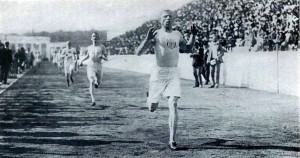
1906 Olympic Final: Lightbody (USA) from McGough (GB)
The 1906 Intercalated Games, celebrated in Athens, Greece, were an abberration, the only Games in Olympic history to break the quadrennial sequence. There was no UK selection process per se. Eligible athletes were invited to notify the A.A.A. of their definite intention to compete on the understanding that they would do so at their own expense. Only a small number of entries were received from British athletes, owing to the prohibitive cost of travelling to Athens and back, and the sheer amount of time involved in making the trip. They included several Oxbridge students and Lieutenant Halswelle, the great Scots hope. With Ireland competing under the British flag, given that it did not have a national Olympic committee, the two feuding Irish amateur athletics federations, the Irish Amateur Athletic Association (I.A.A.A.) and the Gaelic Athletic Association (G.A.A.), raised subscriptions to send three of their athletes. The roster also included the Bellahouston pair of John McGough and William Davison Anderson, whose participation was, presumably, paid for by a subscription and/or by a grant from the special fund of £208 that the Greek government had given to the English A.A.A. Notable absentees included Alf Shrubb, who had turned professional after being suspended; and George Butterfield, a busy hotelier.
The five-day itinerary would see the British team journey by boat from Dover to Dieppe and by train across Europe via Paris, Turin, Brindisi and Bari, then by boat to Corfu and Patras, and finally on to Athens. The three-day rail journey was something of an odyssey as food was in short supply and rumbling stomachs were the order of the day. It was not until the athletes boarded the steamer in Bari that they had their first square meal since leaving Britain. On their arrival in Athens the visiting teams were billeted at the Zappeion, where catering was provided by the organisers, but the Americans, among others, were unhappy about the arrangements and the food, and moved out and checked into a hotel. McGough had four days to settle in and acclimatise to the hot conditions before taking part in the 800 metres. With only the first two to progress to the final, he was eliminated in the fourth heat, won by the American Paul Pilgrim, the eventual gold medallist in this event, in 2:06.6. The relatively modest times posted throughout the games were accounted for by the slow running track in the Panathenaic Stadium, an elongated horseshoe-shaped 400 metre circuit with long straights and bends so tight they were virtually turn-arounds. To make matters worse, the surface was of loose sand and ashes, which, without an underlying layer of clay, made the going soft and heavy. Later that afternoon McGough turned out for the final of the five miles, where he was one of twenty-five starters. A blistering pace was set from the gun as the runners from the various nations vied for pole position. England’s Henry Hawtrey, the favourite, took command in the second half of the race, and lived up to his billing by pulling clear of the field to win by 50 yards in 26:11.8 – a fast time given the circumstances. Ireland’s John Daly was third past the post, but was disqualified the next day for bizarrely obstructing the Swede Edward Dahl in the home straight by running zig-zag, owing, he claimed, to exhaustion. McGough finished, but was outside the first eight. His outings on 25th April, though fruitless, gave him the invaluable opportunity to tune up for his main event and get to grips with the peculiar track. The 1500 metres heats were decided on the afternoon of 27th April and preceded by a spot of tourism unthinkable in elite track and field athletics today. The British team had, namely, begun the day by visiting the Acropolis! That wasn’t a problem for McGough, of course, who was well used to putting in a full day’s work before donning his spikes. The trouble with the afternoon programme was that there was no timetable. In any case, protocol dictated that competition not commence until the arrival of the King and the royal family, who attended the games every day and even helped out with officiating field events. McGough and his fellow athletes had no option but to hang around waiting for their turn. The first of two heats fell to 1904 triple Olympic champion Jim Lightbody (USA) in 4:19.4, with Kristian Hellström (Sweden) second, James P. Sullivan (USA), third and Greg Wheatley (AUS) fourth. McGough won the second in 4:18.8, with Reginald Crabbe (GB) second, George Bonhag (USA) third and Harvey Cohn (USA) fourth. Both qualifying rounds were relatively close affairs, and there was not much to choose between the eight finalists. In the final two days later the pace was set by George Bonhag, with Greg Wheatley (AUS) second, Cohn third and Lightbody, the holder, fourth entering the last lap. McGough was sitting at the back of the pack, as he had done throughout the race together with Crabbe. Bonhag was moving along at a great lick and had the field strung out behind him in more or less single file, but had no response when Hellström made his bid for glory approaching the last bend. For a moment, the big Swede looked all over a winner, but Lightbody quickly covered the move and unleashed a devastating burst of speed which saw him open a gap on the field. McGough, who was badly placed when he hit the home straight, summoned a great finish which carried him past all of his rivals bar one to clinch the silver medal. There was, however, no denying the fair-haired University of Chicago student, who won with five yards to spare, arms raised aloft in celebration. The winning time was worth only about 4 min. 30 sec. for the mile, but on this track it was a brilliant piece of running.
Result: 1, James Lightbody (USA) 4:12.0; 2, James McGough (GBR) 4:12.8; 3, Kristian Hellström (SWE) 4:13.6
McGough’s compatriots did well, too. William Anderson qualified for the 400 metres final after winning the repechage race in 53.0, the equal fastest time of the Games, but was out of sorts in the final two days later and wound up eighth and last. Wyndham Halswelle was decorated with silver in the 400 metres and bronze in the 800 metres, being the only British double medallist if you exclude Irish jumpers Con Leahy and Peter O’Connor, who were forced to compete under the British flag. Though eclipsed by Halswelle, McGough has the distinction of being the first Scottish athlete to win an Olympic medal. The first Scot to win an Olympic medal in any sport was, incidentally, golfer Walter Rutherford, who won silver at Paris in 1900.
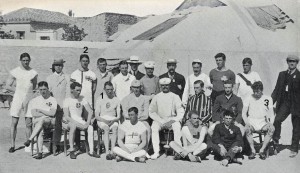
British Olympic Team: McGough 1, Halswell 2, Anderson 3
When McGough arrived back to Scotland a few weeks later the national track season was just getting under way. Both McGough and Anderson, revealed the Glasgow Herald, spoke highly of the treatment they received while at Athens. A few days after his return McGough turned out in the National A.C. meeting at Parkhead and won the half mile handicap at a canter in 2:06.2. The Herald reported: “The feature of the meeting was the running of John McGough in the half mile handicap, which he won pretty much as he liked. The going was again heavy, otherwise he would have put in an even better performance. The trip to Athens has done McGough some good, and there are substantial grounds for assuming that his reputation will be vastly enhanced this season.”
The pick of McGough’s other early-season outings was a 600 yards flat race invitation handicap against rivals Halswelle and Anderson in the Clydesdale Harriers sports at Parkhead on May 26th. Halswelle had given starts of 15 yards to McGough and 10 yards to Anderson, and, despite being baulked twice, took the lead a furlong from home and won a brilliant race by 4 yards from McGough in a Scottish record time of 1:12.8 for this rarely-run event. After that McGough put in a series of fast races over his preferred distance, the mile. He started with a 4:27.6 at Powderhall Grounds on June 6th, and followed that up with a 4:24.8 at Parkhead on June 18th and a 4:25.0 at Powerhall Grounds on June 20th, still finding the time in between to take second in a mile and a half handicap at Ibrox Park on June 16th.
This of course augured well for the S.A.A.A. championships, decided at Powderhall Grounds in favourable weather before 6000 spectators on Saturday 23rd June. The half mile, in which McGough faced, among others, Wyndham Halswelle, the Olympic bronze medallist in this event, went pretty much by the form book. McGough led the field of four until entering the home straight, when the holder, Anderson, retired, leaving Halswelle and McGough to fight it out. Halfway up the straight the Lieutenant burst ahead and streaked to victory by seven yards in 2:00.4. McGough just held off club-mate, 21 year old Jimmy Vallance, a fellow postman, to take the silver medal in 2:01.5. An aspect of early S.A.A.A. championships was that medals were awarded to only the first two in each event, bronze medals being given to all those who, not taking the first or second place, reached the standard fixed by the General Committee. This was the case with Jimmy Vallance, whose 2:01.8 was comfortably inside the 2:03.0 standard. In the mile, A.M. Matthews, Edinburgh University AC, made the pace for three laps, then McGough drew level and kicked away to win easily by 12 yards in 4:32.6, thus extending his stranglehold on the event to five wins in a row. The most noteworthy feature of the meeting, though, was the running of Wyndham Halswelle, who amassed four titles, a feat unprecedented and unmatched in the annals of the Scottish championships. In addition to winning the afore-mentioned half mile, he was first in the 100 yards in 10.4, the 220 yards in 23.2 and the quarter mile in 51.4.
A fortnight later McGough lined up for AAA mile championship at Stamford Bridge, alongside a strong field including George Butterfield and Olympic five miles champion Henry Hawtrey. A sixty-second opening quarter quickly saw the field strung out, Hawtrey among others finding the pace too hot, but some half a dozen men were still together when the bell rang, with McGough sitting at the back of the pack. F.A. Knott , of South London Harriers, led until a furlong from home when Butterfield surged into an eight yard lead. A few seconds later McGough came out of the ruck in hot pursuit, but though he managed to make up a little ground, it was a case of “too little, too late”. A sub sixty second last lap saw Butterfield streak home the winner by four yards in a superb 4:18.4. McGough recorded a personal best of 4:19.2 in finishing second, eight yards ahead John Lee, of Heaton Harriers. The race was one of the fastest in A.A.A. championships history, the winning time not far outside the British record of 4:16.8 set by Joe Binks in 1902. Alongside Halswelle’s emphatic 48.8 sec. win in the quarter mile it was the outstanding performance of the championships. McGough would have taken some consolation in becoming only the third Scottish amateur after Hugh Welsh and Charles Henderson-Hamilton to break 4 mins. 20 secs., but the overriding feeling would probably have been one of frustration over finishing a close runner-up for the third time in a row. “From a Scottish point of view the most disappointing result was the mile, in which John McGough for the third time had to be content with second place – twice to George Butterfield and once to A. Shrubb. While the race, from the time aspect, was the best the Bellahouston Harrier had yet accomplished, it was, in tactics, absolutely the poorest in which he had performed for some time. For some inexplicable reason he lagged far behind till the last lap, or thereabout, and when he did make his effort it was too late. Still, he was finishing faster than Butterfield, and with another twenty yards he would have won. If only the feet had Butterfield’s head, he would be invincible over the mile. “ If any criticism could be levelled at McGough, then it was his poor tactical judgement, sentiments echoed by John Keddie in “Scottish Athletics”: “He had a habit of hanging back in a race, which presented few problems in domestic competitions, but often meant in International events that he gave himself too much to do in the closing stages”. In fact, he was about to make his worst-ever tactical mistake.
The 1906 Scoto-Irish International, the twelfth meeting between the two countries, was held the following weekend at the Ulster Cricket Club, Belfast, in an atmosphere of acrimony between the G.A.A. and the I.A.A.A., whose long-standing working relationship had broken down earlier in the year. McGough had competed at a Celtic FC meeting in Belfast under G.A.A. rules two days earlier, winning the two miles and finishing third in the one mile handicap, off 15 yards, in an excellent time of 4:20.0 worth about 4:23 for the full mile. Little did he know that his actions would have consequences, but more on that later. In the international match on July 14th he was teamed with A.M. Matthews in the mile, and the Scottish pair made the pace closely tracked by the Irish runners Ivo Fairbairn-Crawford and George Morphy. This is how it remained until the last lap, when McGough slipped away and looked to have the race sewn up before inexplicably snatching defeat from the jaws of victory. With a terrific sprint, Morphy caught McGough napping just before the finish line and beat him by a foot in 4:33.2. The Glasgow Herald made no bones about it, his defeat was down to bad tactics: “The surprise in Belfast was the defeat of John McGough in the mile. Over-confidence no doubt was to blame, for, however good a runner G.N. Morphy may be, he is not in the same street as the Bellahouston Harrier. All the same, it must be admitted that McGough is not a good performer in scratch races.” This was harsh criticism given that McGough had, within the space of five seasons, accounted for nine Scottish track titles, two Irish titles, three Scotland v Ireland titles, three A.A.A. silver medals and an Olympic silver medal.
McGough subsequently ran a couple of low-key races, winning them all, including a fast mile at the Abercorn F.C. sports in Paisley on July 21st. The Herald: “The best races was the one mile handicap, which John McGough won in 4 min. 25 1-5 sec., which is a very fine performance, considering the size and condition of the track. The S.A.A.A. champion has had a very successful handicap season, it is only in scratch races that he had failed to rise to the eminence of his powers.”
He had a week to sharpen up for the West of Scotland Harriers meeting at Parkhead, where he and George Butterfield, both off 5 yards, were the backmarkers in a specially framed half mile invitation handicap. The crowd was not disappointed when both men, despite the miserable weather, scorched round the track and carved up a good field, Butterfield winning by a yard and a half from McGough. The times were outstanding:1:57.2 to 1:57.4. McGough would have bettered the native record had he run through to the full 880. Be that as it may, by running 875 yards he had, unbeknown to anyone, run the fastest ever 800 metres by a Scot!
Though this was his longest season to date, the good performances just kept on coming. “John McGough”, wrote the Glasgow Herald, “appears to be in irresistable form”. When the W.S.H. meeting continued on the Monday evening, McGough turned out in the pouring rain for the mile and a half handicap. Despite conceding big starts, he caught the last of his rivals at the bell and won with the greatest of ease in 7:00.0. Two days later, in a Wednesday evening meeting at Larkhall, he took the one mile handicap in 4:27. Then, on Saturday 4th August, he put in an appearance at the Glasgow Rangers F.C. sports, held of course at Ibrox Park before 12,000 spectators in unsettled weather. In the final of the half mile handicap, after a close race, he was first off 5 yards and ran on to complete the full distance in 1:59.4. Earlier in the day, in the third heat, he had done the full distance in 2:01.0. When the meeting resumed on the Monday evening, McGough and Butterfield, for a change, kept out of the way of each other. Butterfield, though unplaced, delivered the best performance of the meeting by setting a Scottish all-comers record for the 1000 yards of 2:16.6. McGough, for his part, provided the other highlight in the mile and a half handicap. In his sixth race in just nine days, he finished second in 6:54.6, only two sec. outside his own record for the distance.
The following weekend it was the other half of the Old Firm’s turn to hold their annual sports. Celtic F.C. were, certainly at the time, the mecca of the Scottish athletic world, their meeting drawing together an impressive assemblage of 30,000 people in excellent weather. Wyndham Halswell was the magnet, the Lieutenant duly turning out in three events – the 100 yards, the quarter mile and the half mile. His victory in the 440 yards handicap was the feature of the meeting. In spite of a heavy handicap and the soft track, the “epochmaker”, as he was labelled, won by six yards and lowered his own Scottish native record by six tenths to 49.0 sec. “Halswelle’s 49 sec. here,“ opined the Herald, “is equal to 48 sec. in England, and the magnificence, as well as the significance of the performance can only be appreciated by those who are in a position to contrast the conditions in Glasgow with those in the South of England.” Not to be outdone, McGough produced a tremendous effort in the one mile handicap to get within six yards of catching A.B. Hepburn, who won in 4:20.8 off 115 yards. His time from scratch was a Scottish native record of 4:21.6, clipping two seconds off the former record which had stood to the credit of Hugh Welsh since 1898. Later in the afternoon he again toed the line in a special half mile invitation race against rivals Butterfield and Halswelle. Though he had been given a five-yard start, he was, understandably, running on tired legs, and was just run out of it, Butterfield winning by a foot from Halswelle in two minutes dead. As to his performance in the mile, the Glasgow Herald wrote: “This is his second best public effort, the best being his 4 min. 19 sec. at the A.A.A. Championships last month. We have been expecting a new record from him for some time back; indeed, all his performances since the West Harriers meeting when he did the mile and a half in 7 min., have led up to this brilliant effort, and like every clever article, he keeps the best till last. Being closely associated with the Celtic Football Club, McGough is naturally proud that Parkhead shares with him the glory of the record.” One may ask as to what exactly is meant by “closely associated”? As far as is known, McGough was a follower of Celtic F.C. and gave the club his services as an expert masseur during the winter months when he was not competing.
McGough returned to Parkhead when the Celtic F.C. fixture resumed on the Monday evening and uncorked a powerful finish to claim the one mile handicap from John Lee, Heaton Harriers (25 yards), and arch-nemesis George Butterfield. His winning time of 4:23.2 was, relatively speaking, a superior performance to his record run on the Saturday considering the sodden track. Again, though, he stood in the shadow of Wyndham Halswelle, who showed off his prodigious versatility by running second in the 110 yards sprint and then winning the 1000 yards handicap from scratch in 2:19.0. As the Glasgow Herald put it: “Another light, a little less replendent than the Lieutenant, is John McGough, of the Bellahouston Harriers.“ Although McGough and Halswelle came from very different backgrounds, they had lot in common – they were about the same age, both were Catholic, they shared the experiences of the Athens adventure and came home Olympic medallists, they were the leading lights of Scottish athletics, they were sometime rivals; and, last but not least, they were both coached/advised by former professional miler Jimmy Wilson, the popular trainer of Rangers Football Club.
For McGough, it had been a long five months since embarking on his expedition to Athens, but his season was not over yet. There was still the small matter of defending the British G.P.O. mile title, which he had taken at Putney the year before. To that end, he again had to travel all the way south to London. The 1906 Postal Service sports were held under the auspices of St. Martin’s Harriers at Herne Hill Velodrome on Saturday 15th September. Presumably to make the journey worth his while, McGough competed in three events. He was the virtual scratch man in the half mile, off 5 yards, conceding starts even to the likes of Jack George, a real speed merchant. The South London Harrier had, that year, run superb times of 50.2 sec. for the quarter and 1:57.8 for the half. Inevitably, off 11 yards, George won comfortably. McGough didn’t stand a chance, but completed the half mile by running 5 yards beyond the winning post in a personal best of 1:58.2. Though six tenths of a second inside William Anderson’s Scottish record, the mark did not find its way into the record books of the S.A.A.A., which recognised only native best performances achieved in Scotland. In a mile relay race (won by the Glasgow P.O. team) he ran the half mile in 2:01.8. Finally, he stamped his authority on proceedings in the mile championship of the Postal Service, taking only 4 min. 38.8 sec. to retain the title of “fastest postman in Britain”.
McGough‘s final race of the season on September 26th required that he journey to the other end of the country, having been selected to represent the Rest of Scotland in a match against Scottish Students in Aberdeen to commemorate the quartercentenary of the university. The athletics events were decided on the grass track at King’s College Recreation Ground before a large gathering. In the mile McGough defeated Edinburgh University student A.M. Matthews, his sole opponent, by two yards in 4:30.8. This win was actually one of three by the Bellahouston Harriers, who contributed six points to an 18 points to 12 triumph for the Rest of Scotland team, R. Kitson taking the 220 yards in 24.4 and Jimmy Vallance the quarter mile in 54.2.
The Glasgow Herald encapsulated his 1906 season thus: “Next to Lieutenant Halswelle, there is no more interesting personality in athletics circles than John McGough, of the Bellahouston Harriers. The S.A.A.A. champion is one of ourselves in the sense that he is a product of the Glasgow school of athletics, and that, no doubt, accounts largely for his popularity in and around the city. McGough has had a very successful season – in fact, the most successful in his career. He may have won more prizes last season, but his racing has touched a higher level this season, and that, after all, is the greater account than the accumulation of silver plate. His best performance was in the English championships in July, when he ran second to George Butterfield in the mile in 4 min. 19 sec. McGough should have won this race, as at the finish he was comparatively fresh, while the Darlington runner was all out. McGough did the mile at Belfast in 4 min. 20 sec., which is his next best performance; while his Scottish record at the Celtic sports comes next, though possibly it will be remembered long after the others are forgotten owing to the fact that it is enhanced in the official records of the S.A.A.A.“ The naked figures for the season were 14 firsts, 9 seconds and 2 thirds. But, of course, they do not tell the full story.
As hinted at earlier, McGough was inadvertently caught in the maelstrom of Irish political in-fighting during the early part of the season, when he was suspended by the I.A.A.A. for competing in a meeting held under G.A.A. rules in Armagh. Prior to the falling-out, athletes had competed with impunity in the promotions of both governing bodies, and McGough had, perhaps naively, availed himself of this freedom. The spirit of goodwill having evaporated amid the widening rift, he found himself being made an example of. Fortunately, he was later reinstated after arguing that he taken part in the proceedings purely for charitable purposes. As one might imagine, a champion runner like John McGough was a coveted asset and, hence, possibly more eligible for clemency than, say, lesser mortals.
1907 season
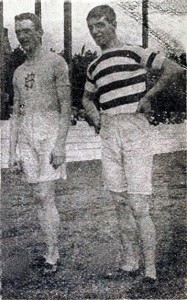
With James Vallance (Bellahouston) at Ibrox, 1907
McGough kicked off his 1907 season by making an appearance in the I.A.A.A. championships on May 20th at the RDS Showgrounds in Dublin, where his participation might be seen as a conciliatory gesture to the I.A.A.A. after its decision to rehabilitate him several months earlier after he had flouted their rules. Entered as “John McGough, Castleblayney & Bellahouston Harriers” he was unplaced in the half mile, but later turned out to win the mile by inches from George Morphy in 4:48.0. Of course, the opportunity to compete in Dublin also gave him the pretext to represent Castleblayney, where he still had family. The McGoughs, like many an Irish family uprooted by poverty, kept close ties with their ancestral homeland.
As was his usual modus operandi, McGough did several tune-up races prior to the Scottish championships beginning with a 4:27.2 mile in the Bellahouston Harriers meeting at Ibrox Park on June 1st. “The mile flat handicap”, reported the Herald, “witnessed a fine effort from John McGough, who finished second in 4 min. 27 1-5 sec., which on a sodden, heavy track, shows what he might have accomplished under more favourable conditions.” The vagaries of the Scottish climate have always had a major bearing on T&F performances during the summer season, even more so in the days of grass and cinder tracks, which were typically not well drained and, thus, at the mercy of the elements. When the meeting continued on the Monday evening McGough took on George Butterfield in a special one mile match, which, however, was as disappointing as the attendance, McGough winning by 15 yards in 4:36.0 before a mere smattering of spectators. As a result of the low overall attendance, the sports were a financial failure and Bellahouston Harriers incurred a big loss which could have threatened their existence were it not for some new-fangled accounting.
The going was also “extremely sticky” at the Queens Park FC sports on June 15th at Hampden Park where McGough delivered the outstanding performance of the meeting in the one mile handicap losing by just a few inches from scratch in 4:24.8 – a time the Herald’s athletics expert reckoned to be worth around 4 min. 20 sec. in good conditions.
Heavy and blustery conditions again greeted the competitors in the 25th annual Scottish championships held at Powderhall Grounds on June 25th. With the holder Halswelle unable to defend his title in the half mile after picking up a thigh injury in the 220 yards sprint, McGough had no trouble securing his third title in this event in 2:06.8. His winning margin of half a yard over Jimmy Vallance belied the ease with which the victory was accomplished. With William Anderson taking third, Bellahouston Harriers scored an historic 1-2-3 clean sweep. McGough had even less difficulty defending his crown in the mile, which he won by 10 yards from A.M Matthews in 4:34.2. As the Herald put it, “John McGough captured the half and mile events without turning a hair.” By winning his sixth consecutive mile title, he took possession of the 25 guinea challenge cup for this event for the second time. Also celebrating his sixth successive title was hammer thrower Tom Nicholson, who would go on to win the Scottish hammer title an amazing 19 times in a row, in addition to amassing 14 shot put titles.
Scottish hopes in Scoto-Irish International held at Ibrox Park on June 29th in front of 6,000 spectators in fine weather suffered a blow when Wyndham Halswelle pulled out on account of the injury he had sustained at the Scottish championships. The Scottish team without Halswelle was well below strength, and as a upshot of this lost narrowly by 5 points to Ireland’s 6. McGough had been selected to run in both the half mile and the mile, but only took the latter event seriously. The “half” was a tremendously fast race, Ireland’s Ivo Fairbairn-Crawford front-running his way to an impressive victory in an all-comers’ record of 1:57.2. Finishing close behind was Jimmy Vallance, who ran a blinder to clock 1:59.0 for second place. McGough gave up early in the second lap, as did George Morphy, both men evidently saving something for the mile. In the mile, with A.M. Matthews out injured, John Ranken set the pace until a lap from home. Then McGough went to the front and launched a long sprint which took the sting out of Morphy’s finish and carried him to victory by 20 yards. McGough would have been delighted by his fast time of 4:22.2, but perhaps even happier about avenging his defeat by the Irishman in Belfast the year before. Ireland were without a second string since McGough, I.A.A.A. champion, and Scottish champion, had been selected by both sides! “sportsman” had this to say: “McGough did not seem to be more than stretching his legs in the half mile. That was only natural, as, with the mile in view, he wanted to harness his reserve energies for the latter event. He certainly ran a good race over the longer journey, and his sprint at the finish was longer sustained than usual. McGough’s 4 min. 22 1-5 sec. was as smart a bit of running for a mile as he has shown this season.“
McGough’s strong performance in Glasgow again saw him pegged as one of the favourites for the A.A.A. mile championship to be decided on July 6th at the Manchester Athletic Ground in Fallowfield. He was still searching for his first win in this event after finishing second for three straight years. Unfortunately, a strong wind kept down the attendance and a sodden cinder track prevented any new records being accomplished. A field of eight runners faced the starter in the mile. W. Cottrill, of Hallamshire Harriers, led the first lap in 59.8 sec., but soon fell back, having shot his bolt. Then Deakin, of Herne Hill, took command, closely followed by McGough, Butterfield and Lee, and held that position until the end of the third lap. As the bell rung out Lee made his effort early and opened up a gap of three yards, but Butterfield’s strength told over the last furlong into the wind. The Darlington Harrier charged past the Heaton Harrier in the home straight and ran to the tape a winner by 3 ½ yards in 4:22.4, a last quarter of 63 sec. doing all the damage. Behind him, Deakin got up to snatch second place away from Lee by a foot. McGough was run out of it on the last lap, and retired, presumably after having realised the race was a lost cause. The Herald’s analysis: “George Butterfield’s 4 min. 22 2-5 sec. for the mile must be considered in some respects his greatest achievement, and in the light of that fact, which will scarcely be disputed, it is easy to account for the defeat of John McGough, not that the Bellahouston Harrier, up to a certain point, ran indifferently by any means, but the Darlington man happened to excel himself.” In spite of McGough’s failure, Bellahouston Harriers rejoiced in an A.A.A. title courtesy of 32 year old ex-soldier Tom Kirkwood, who retained the shot put title he had won the previous year whilst serving in the Liverpool Scottish Volunteers. Jimmy Vallance also picked up a standard medal after finishing fourth in the half mile in 2:01.0.
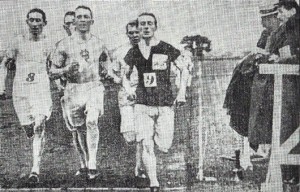
AAA’s Mile, 1907, Robertson 8, McGough, Deakin 9 and Butterfield behind Deakin
The following weekend McGough made his way down to London and, representing Glasgow G.P.O., comfortably defended his title in the One Mile Championship of the Postal Service at Herne Hill Velodrome, winning by 25 yards from C.S. Read in 4:42.4. By winning the mile championship for the third time in succession, under the rules then in place, the Dewar Challenge Shield was his to keep. Afterwards he ran an excellent race from 15 yards in the one mile handicap, doing about 4:22.4 for 1745 yards, although hampered by a big field.
What happened next is unclear, but it appears that McGough was badly spiked in a low-key race at Liverpool, as a result of which he suffered an injury that impacted the remainder of his campaign for that year. The month of August 1907 was certainly one he would have wanted to forget in a hurry. He was below par for weeks on end and failed to finish a string of races, but to his credit, at least he attempted to honour his engagements. It took until September for the injury to clear up, by which time, however, the British track and field season was effectively over. Keen to get a few races in before hanging up his spikes for the year, he obtained permission from the A.A.A. to run at meetings in Kristiania (Oslo) and Stockholm. His first race was a 5000 metres at Kristiania on September 14th , but misfortune struck and he missed the start owing to the late arrival of his boat. The following day, however, he got to the stadium on time and lined up for the 1500 metres and came home second behind Austrian internationalist Felix Kwieton in 4:22.0. Then it was on to Stockholm for a three-day international meeting where Britain was represented by McGough and three A’s 100 yards champion John Morton (South London Harriers), each competing in three events. Morton was in blinding form, winning the 100 yards in 10.2 sec., the 100 metres in 11.2 sec. and the 150 metres in 16.7 sec. Unfortunately, the same cannot be said for McGough in the middle distance events where the standard would have been well within his compass had it not been for the fact that he was still nothing like at his best. In his first outing, a 1500 metres on September 20th, he was beaten into third place, trailing home some 30 yards adrift of the winner, Sweden’s Edward Martin Dahl, in 4:16.8. In the 800 metres on the following day he could finish no higher than fourth, but showed improvement by returning a reasonably good time of 2:01.6. The third day of the meeting saw him finish unplaced in a fast 3000 metres, in which Dahl again stamped his authority on the race with an impressive 8:55.0 clocking. Having enjoyed the sightseeing and the hospitality of his Scandinavian hosts, which would have gone some way to atoning for his underwhelming performances, it was back to Glasgow where the mail was no doubt piling up after his week-long absence.
It had been a season for mixed fortunes for McGough, capped by an impressive victory in the all-important Scotland vs. Ireland fixture in an excellent time just outside his own native record. Other highs were his victory in the I.A.A.A. mile championship and his half/mile double at the Scottish championships, where he took ownership of the mile challenge trophy for the second time after winning the event for the sixth time in a row. The Dewar Challenge Trophy also became his absolute property after winning the British G.P.O. mile title for the third time in as many years. Lows were, of course, his disappointment in the A.A.A. championships and the spiking-related injury which he suffered at Liverpool, ruining the remainder of his season at home and scuppering his chances of setting any records at the August meetings in Glasgow. Consequently, for the first time in several seasons, McGough was not his club’s most successful performer, that particular honour going to Jimmy Vallance. A late-season tour of Scandinavia produced a mixed bag of results, but at least it gave him another taste of international competition, and the chance to end the season on his own terms.
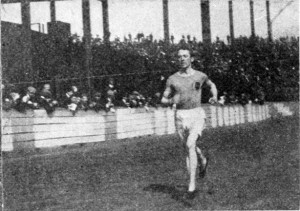
John McGough, Ibrox, 1907, Scotland v Ireland
From the outset, the 1908 season was dominated by the Olympic Games which were to be held in London. The 1908 Olympic Games had originally been scheduled to be staged in Italy, but after the eruption of Mount Vesuvius in 1906 the overwhelmed Italian government relinquished the right to host the games, whereupon the British stepped into the breach at short notice. Lord Desborough, chairman of the British Olympic Committee and the driving force behind the British effort, persuaded the organisers of the Franco-British Exhibition in London to build a multi-purpose stadium, the largest in the world with a seating capacity of 68,000, at no cost to the B.O.C. in return for three quarters of the ticket and programme sales. The White City Stadium was truly built on a Olympian scale, the giant cinder track measuring just three laps to the mile. The news that Britain would be hosting the Olympic Games in 1908 generated unprecedented home interest across all sports, the competition for the generous allotment of starting places in the track and field events being particularly intense. The S.A.A.A., as one of the regional associations eligible to enter a contingent, arranged for several trials to be held over metric distances at concurrent meetings in Edinburgh and Glasgow on June 6th. The “1500 metres S.A.A.A. Olympic Trial” was decided in conjunction with the Bellahouston Harriers sports at Ibrox Park imparting a “dash of novelty” to the programme, although the attendance (1,500) was a little disappointing in view of the fine weather conditions. With just a couple of low-key races under his belt, McGough was raring to go, even if he only had just one opponent in the shape of Sam Stevenson. The Clydesdale Harrier had narrowly beaten McGough in a mile handicap at Wishaw a couple of weeks earlier, but was not expected to trouble the Bellahouston Harrier in a race on level terms. Nevertheless, a spirited contest was witnessed by the diminutive crowd, both men duelling it out through the vast emptiness of Ibrox Park before McGough turned on the speed on the last lap to win by 30 yards in a Scottish record of 4:10.2. For good measure, McGough turned out in the one mile handicap later in the proceedings and produced an excellent run from scratch to get within a yard of Robert Magura, Glenpark Harriers (115 yards), in 4:25.4 – his fastest in over ten months. For these performances McGough was nominated alongside 11 others to wear the British colours in the 1500 metres at the London Olympics.
On the surface, it looked as if McGough was rounding into form with the Olympics just over a month away, but by the following week it was public knowledge that he was nursing an ankle injury after he pulled out of the Irish championships. Contrary to expectations he turned out in a mile handicap at Saughton on June 17th, but failed to do himself any justice and retired well before the finish. It was the same story at the Queens Park Rangers sports held on June 20th at Hampden Park, where he was unplaced in the one mile handicap. “John McGough,“ wrote the Herald, “was not seen at his best; as a matter of fact, it was obvious to all that he was running under physical disabilities. With the championships so near he should have been resting on Saturday instead of aggravating his infirmities.“ His subsequent absence from the S.A.A.A. championships the following weekend spoke volumes. The injury, reportedly a “weakened tendon achilles”, was evidently worse than first thought and bad enough to seriously derail his Olympic preparations. In his absence, Rob Burton, Berwickshire Harriers, won the S.A.A.A. half mile in 2:02.0 and the old Watsonian Harry Jamieson, Edinburgh University AC, took the mile in 4:33.8.
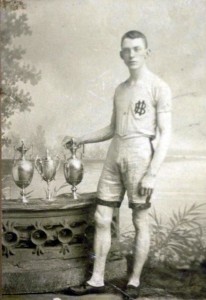 John McGough with SAAA Challenge Cups
John McGough with SAAA Challenge Cups
On July 8th, five days before the heats of the Olympic 1500 metres, the Evening Telegraph revealed that McGough had taken “a quiet week in Ireland with a view to his complete recovery from the minor mishap which prevented his running in the championships.”
Two days prior to the games, McGough finally tested his strapped-up foot and his form by turning out for Scotland at the annual Scoto-Irish contest. The encounter took place at the Scottish National Exhibition Grounds in Saughton, Edinburgh, the Scottish equivalent of the Franco-British Exhibition in London. Features included a sports ground complete with a quarter mile cinder track, which, however, was loose and heavy after recent rainfall. In the mile, the Irish champion Morphy made the mistake of watching McGough rather than Harry Jamieson, who stole a march early on and led by 20 yards at halfway. Neither Morphy nor McGough was able to make up the deficit the lanky Scottish champion, who was no stylist but very effective, winning by 3 yards from Morphy in 4:39.0, who, in turn, was just ahead of McGough. It was no the confidence-building performance he would have hoped for in the run-up to the Olympics but at least he was, for want of a better phrase, back on track.
The qualifying rounds of the 1500 metres were decided on July 14th, the second day of the track and field programme. There were eight heats, and with only the winner advancing to the final. They were unevenly seeded and consequently a string of “big guns” fell at the first post. There was a shock in the very first heat, when reigning champion Jim Lightbody was eliminated. Then, in the second heat, McGough’s great rival George Butterfield was unceremoniously knocked out. In the third heat, the Italian champion Emilio Lunghi failed to progress to the final despite smashing the Olympic record. McGough was next up, drawn in heat 4 alongside Vincent Loney (GB), Harry Coe (USA), Stylianos Dimitriou (GRE) and Joseph Dreher (FRA). The Official Olympic Report noted that McGough’s left ankle was bandaged and that he “set a lively pace until just before the bell“. Handicapped by his injured achilles tendon, however, he was unable to respond when first Loney and then Coe shot past him on the last lap, Loney winning by 3 yards from the American in 4:08.8. A disconsolate McGough trailed home third some 50 yards adrift in 4:16.4 and took no further part in the proceedings.
His outright Scottish 1500 metres record of 4:10.2 was to be short-lived, Arthur Robertson improving it to 4:07.2 in Stockholm in September 1908.
For McGough, it had been a cruel twist of fate to suffer injury at the time of the Olympics because he was back to something like his best within a few weeks of his early exit from the 1500 metres. He had something to prove when he turned in in the Rangers Sport on August 1st, a week after the conclusion of the track and field programme at the White City stadium. The meeting featured a mouth-watering billing that included several Olympic medallists and international stars, attracting a big crowd of 15,000 spectators, who were treated to some excellent sporting fare despite the windy conditions. Emil Voigt, Manchester, the Olympic five miles champion, was sublime in the four miles, winning by 30 yards from another gold medallist, the Scot Arthur Robertson, in an impressive time of 19:40.0. The newly crowned Olympic 400 metres champion Wyndham Halswelle was a whisker outside his own Scottish all-comers’ record in the 300 yards handicap, where he finished second in 31.4 sec. In the 100 yards dash Olympic 100 metres champion Reginald Walker, of the South African Olympic team, took advantage of the wind at his back to clock a brilliant 9.8 sec. in his heat, this being the first ever sub-ten performance witnessed on Scottish soil. The mile handicap saw McGough drawn alongside Olympic 1500 metres silver medallist Harry Wilson, Hallamshire Harriers, and his old adversary George Butterfield on the scratch mark. Unfortunately the starts were too much for even these fine athletes and the race was won by R.S. Sinclair, Glenpark Harriers, who had the limit. McGough was fifth past the post in about 4:28.0 and surprised many, perhaps even himself, by defeating Wilson by several yards. His performance would, no doubt, have elicited mixed emotions – delight that he had beaten the Olympic silver medallist tempered by frustration over his recent tribulations. In the supplementary meeting two days later, he started in two races, devoting his main effort to the half mile, where finished third behind the Olympic 800 metres champion Mel Sheppard (USA) and Butterfield in two minutes dead after pacing Sheppard to a Scottish all-comers’ record of 1:56.0.
McGough concluded his Scottish campaign on August 19th when the represented the S.A.A.A. select in a match against the Irish Americans at the National Exhibition Grounds and was outsprinted by teammate Harry Jamieson in a tactical mile race in which both Scots had the satisfaction of beating the American couple. McGough, it was noted, “whose strong point used to be finishing, could not respond to Jamieson’s challenge.” A topsy turvy season indeed.
1909 was to be a relatively quiet year by McGough’s prolific standards, starting relatively late in the season and ending early. This year he was probably less conspicuous by his absence than would usually have been the case, as Scotland was in the grip of a marathon craze, the event having been popularised at the 1908 Olympic Games by Dorando Pietri, the tragic hero who staggered across the line first after a dramatic finale only to be disqualified. Meeting promoters were incorporating marathon races into their programmes, because, due to their novelty appeal and theatrics, they were a sure-fire crowd-puller. For the first time in his career, he went into the S.A.A.A. championships without having run a single race, foregoing even the chance to compete in the Irish championships in late May. The big question was, therefore, whether he had been able to re-capture form he had shown in 1907. In the week preceding the national championships, the Glasgow Herald was hedging its bets as to the outcome of the mile: “If in form John McGough will be a hard nut to crack in the …mile, though in the latter H. Jamieson, the holder, who is now residing in the North of England, will not part with his honour without a desperate struggle. Jamieson has never done the “times” that McGough has to his credit, but the latter went off last season and it is not public property whether he has regained his distinguishing qualities of 1907.” The S.A.A.A. championships were held at Ibrox Park on Jun 26th before a crowd not numbering many more than 3,000, who witnessed one of the best meetings on record as far as keen contests and close finishes were concerned. As was expected, the mile was one of the finest races of the day. McGough was eager to recover his lost laurels after injury had forced him to reliniquish his title to George Watson’s College student Harry Jamieson the year before. The Scotsman takes up the story: ”Ten of the eleven entrants competed, and the excitement began when the last lap was entered on. The holder (Jamieson), McGough, McNicol (Polytechnic Harriers), and T. Welsh were all together. Later it was a duel between Jamieson and McGough. It was a great finish. First Jamieson went to the front, but McGough passed him, and coming down the straight the western man looked a winner, but Jamieson had something in reserve, and, amid great excitement, won a splendid race in the excellent time of 4 mins. 29 1-5 secs.“ There was less than a yard between Jamieson and McGough, with Douglas McNicol and Tom Welsh also beating the standard time of 4 min. 33 sec. By securing second place, McGough was of course assured of selection for the Scoto-Irish contest. The tone of the Glasgow Herald’s commentary was upbeat: “The defeat of John McGough in the mile was a disappointment to his Ibrox admirers, but the fact of him running so well should be some compensation, as it shows that with a little more practice he will get back to his form of two seasons ago.”
Whether or not McGough could rediscover his form of 1907 remained to be seen, but the Herald was not far off the mark in predicting further improvement. A fortnight after the Scottish championships McGough put in an appearance at his club’s annual sports on July 10th at Ibrox Park, where he finished second in the one mile handicap in a season’s best of 4:26.8. His performance was the feature of a fixture somewhat spoiled by inclement weather. “All things considered,” wrote the Herald, “the racing at Ibrox, on Saturday under the auspices of Bellahouston Harriers of John McGough disclosed vivid signs of his old form in the mile.”
Next up was the fourteenth annual encounter between Scotland and Ireland, which took place at the RDS Showgrounds, Ballsbridge, on July 17th before 4,000 spectators. The result was an easy win for Ireland by eight events to three, thanks in no small part to the appearance of the Olympic 200 metres champion John Kerr, an Irish-Canadian, who set an Irish record of 22.2 sec. in the 220 and equalled the existing record of 10.2 sec. in the 100. For Kerr the chance to represent Ireland was, it was said, the fulfillment of a lifelong ambition. McGough, judging by his close Irish ties, may have harboured similar thoughts, but his loyalty to Scotland in the athletic field was unwavering. In the mile race, one of the most competitive events of the contest, McGough came close to securing a point for Scotland. A strong finish disposed of the Irish champion Ivo Fairbairn-Crawford and the Scottish champion Jamieson, but George Morphy, buoyed by a partisan home crowd, overtook him in the home straight and won by a yard in 4:33.6. Both Fairbairn-Crawford and Jamieson failed to finish. Jamieson, whose full name was Henry Tonkinson Jamieson, was born in Edinburgh on November 30 1885. A chartered accountant, he retired from athletics after the Scoto-Irish contest owing to limited opportunities for training. In 1911 he secured an appointment in Canada and lived there until his death in 1983 at the ripe age of 98.
Uncharacteristically, McGough ran only one low-key race during the next three weeks. Perhaps he had decided he needed to conserve his resources, be it to stay injury free or to be at the best of his ability. In any case, his next major race was at the Rangers F.C. sports, held on Saturday August 7th in fine weather and before a full house at Ibrox Park. The meeting featured many outstanding performances, including, notably, a 9.8 sec. by the South African Reginald Walker in the invitation 100 yards handicap and a Scottish all-comers’ record of 13:57.2 in the two miles walk handicap by Ernest Webb, of Herne Hill Harriers. The mile handicap was no less competitive, Eddie Owen, the scratchman, just getting the better of Clydesdale’s Alex McPhee (45 y) and McGough (15 y) in a thrilling contest. The Broughton Harrier, 1908 Olympic five miles silver medallist, was all smiles after notching up a lifetime best of 4:20.2. McGough ran on to complete the full mile in 4:24.0, which, noted the Herald, was his best showing in a couple of seasons. It was on this high note, however, that he decided to end his season. He did not turn out when the meeting resumed on the Monday evening, and so was spared having to see two of his native records erased from the books. No fewer than seven new records were created at this meeting within the space of just two and a half hours, including two native records that had previously stood to McGough’s credit. In the 1000 yards flat race Adam Turnbull, of the Clydesdale Harriers, knocked two fifths of a second off his record figures, while in the mile and a half handicap Arthur Robertson, Broughton Harriers, not only bettered McGough’s native record but also the all-comer’s record with a time of 6:48.4. Records are made to be broken, as they say, and in those days Ibrox was the place to do it. In good weather the Ibrox was, without doubt, one of the fastest tracks in Britain. With one or two exceptions, all Scottish records had been set there.
1910 season
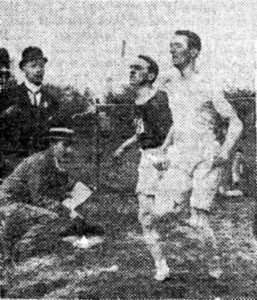 The Finish of the 1910 SAAA Mile Championship: McGough wins from McNichol
The Finish of the 1910 SAAA Mile Championship: McGough wins from McNichol
In view of McGough’s sparse racing programme in 1909, one could be forgiven for thinking that his enthusiasm was waning, but in fact this was not the case – he still had unfinished business to attend to. Although a little past his prime, his 4:24 mile at the Rangers F.C. sports in August had shown that he was still a force to be reckoned with. The Scottish mile title, which had eluded him for two seasons, would have been firmly in his sights for 1910, especially after the retirement of his recent nemesis Harry Jamieson. Sticking to the light racing schedule he had favoured the previous year, he ran only one race ahead of the S.A.A.A. championships – on June 11th, when he dutifully turned out for his club in its annual sports and finished second in the one mile handicap in 4:29. The star of the show, however, was not McGough, but rather his fellow Bellahouston Harrier Richard Quinn, who strode to a Scottish mile walk record of 6:45.6.
The Scottish championships were held on June 25th at the Powderhall Grounds, which on this day were bathed in brilliant sunshine and promised an equally brilliant afternoon of athletics. Few if any of the events decided that day, however, could rival the mile for sheer show-stopping excitement. The Scottish Referee gives a good account of the race: “The one mile was a mile which recalled those of the late A.E. Tysoe and Hugh Welsh on the same ground, or of Andrew Hannah, W. Robertson , or S. Duffus, or of John McGough himself and Murphy in the ‘National at Belfast. The record-holder of the mile was in spanking form, but he caught a tartar in D.F. McNicol, of the London Polytechnic Harriers., an old Edinburgh lad of Duncan [D.S. Duncan] build and heart, who led the champion in grand style to the tape, which he was only prevented bursting first by McGough’s breast, amid breathless excitement. Many imagined that McNicol had actually won, so close was the finish. McGough had the judges’ just verdict, however. The loser forced too much, and should have waited a little longer before making his effort. Champion McGough regained the honour he last held in 1907, and robbed Edinburgh and holder Jamieson of his title. The winner’s quarter miles were: First, 1 min. 7 2-5 sec.; half mile, 2 min. 20 1-5 sec.; threequarters, 3 min. 30 3-5 sec.; and mile, 4 min. 32 4-5 sec.”
This gutsy victory brought McGough’s tally of S.A.A.A. mile titles to seven, equalling the record number of wins in a single running event held by Andrew Hannah, of Clydesdale Harriers, who amassed seven wins in the 10 miles championship between 1889 and 1896. As can be seen from the splits, the race was a tactical affair and only really came alive in the last quarter. In the past McGough had often let himself down through poor tactical judgment, but on this occasion he timed his effort perfectly to defeat such formidable an opponent as Douglas McNicol. The Polytechnic Harrier, who had been born in Chelsea of Scottish parents in 1885, was a rising force in Scottish athletics and destined the following year to win the prestigious A.A.A. mile championship that had always eluded John McGough.
The team to oppose Ireland in the international athletic contest at Ibrox Park was chosen at the conclusion of the championship gathering in Edinburgh. McGough was selected for the ninth time in as many years, which, in those days at least, was remarkable consistency.
The following week McGough ran third in a mile handicap at Beith, where there was much bumping and barging, and it was reported that he “was twice interfered with …or he might have won”. Nonetheless, his time of about 4:27.2 was a season’s best and stood him in good stead for the match against Ireland in a week’s time. On the Wednesday evening, while McNicol was running a mile a season’s best of 4:25.8 at Stamford Bridge, McGough won the mile in a sports meeting held by St. John’s Young Men’s Catholic A.C. at Ibrox. A devout Catholic, he was, revealed the Glasgow Herald, “the means of establishing this club, and that it is a popular denominational institution goes without saying. It has very large membership, and is on excellent terms with all the athletics clubs in the district.“ Another item in the same paper referred to McGough as “the controlling spirit” of St. John’s Young Men’s Catholic A.C. Over and above his demanding day job, his side job at Celtic, his training regimen and his racing schedule, he evidently still had the time and energy to engage in voluntary work in the local community! Adjectives like “indefatiguable” spring to mind.
The sixteenth annual international athletic contest between Scotland and Ireland took place at Ibrox Park on Saturday July 9th. Only 2,000 spectators turned out in sunshine to witness the struggle for supremacy, which ended in a record win for the Scottish team by nine points to two. The mile race, featuring McGough and McNicol representing Scotland and Frank O’Neill and James Bill representing Ireland, promised to be one of the most competitive races of the afternoon – and it did not disappoint. A punishing early pace proved too much for O’Neill, the Irish four miles champion, who dropped out after about half a mile had been covered, leaving McNicol, Bill and McGough to fight out a thrilling battle on the final lap. The Irish mile champion Bill looked to have the race sewn up 40 yards from home, but then McNicol uncorked an amazing finish, which brought a roar from the crowd and victory in the last strides. Both men were given the same time (4:26.0). McGough, unable to get back on level terms, gave up in the home straight. He, too, would have beaten 4 min. 30 sec., but with only the winner counting, there was no point in continuing.
The following weekend, McGough turned out in the annual meeting of the Ayr Football and Athletic Club at Somerset Park, a popular fixture reckoned by some to be the best provincial meeting in the country. In the one mile handicap, McGough, running from scratch in a field 40 runners, put in some excellent work get up to third place. His time was returned at 4:32.0, which, adjudged the Herald, was “a creditable performance for grass.” His clubmate John Templeman, an up-and-coming talent whom he had conceded 30 yards, won in 4:30.2.
With the start of the football season now just a few weeks away, there were only a few more good competitive opportunities left before the domestic athletics season was over, these being the Rangers FC sports on August 6th, the Edinburgh Northern Harriers sports on August 10th and the Celtic FC sports on August 13th.
The Rangers FC sports once again drew a big crowd of 10,000 spectators, but the conditions weren’t great. A stiff breeze was blowing, and while it helped the sprinters, it was very much against the longer distance runners. The mile race, traditionally one of the centrepiece events, attracted a massive entry of 81. There were in fact 69 runners at the start, which was still a big field for a mile race, but that number decreased to 40 within half a mile as runners with starts were overhauled and dropped out. The backmarkers, Eddie Owen (scratch), Harold Wilson (scratch) and Douglas McNicol (15 yards), all ran disappointingly, and not one of the three finished. McGough, with pride at stake after being conceded 20 yards, went out hard and showed his rivals from England a clean pair off heels. Frank Stoddart West of Scotland Harriers (105 y), was leading by 20 yards on entering the straight, and though McGough made a plucky attempt to pull him in, he ran out of track, there being a “good six yards” between the two at the post, while W.F. Taylor, Bellahouston Harriers (135 y), was a couple of yards behind the Scottish champion. McGough’s time off 20 yards of 4:21.6, worth about 4 min. 25 sec. for the full mile, was his best performance of the season, unfavourable weather conditions notwithstanding.
On the Wednesday evening McGough put in an appearance at the fifteenth Edinburgh Northern Harriers sports at Powderhall Grounds. One of the features of the meeting was the running of Rob Burton in the 1000 yards handicap, the Scottish half mile champion winning with ease from Eddie Owen, with whom he started from scratch, returning an excellent 2:19.0 in windy conditions. The mile handicap was another fine race, in which McGough (15 yards) again faced Douglas McNicol (also 15 yards) and the Broughton Harriers pair of Eddie Owen (scratch) and Bill Scott (30 yards). The Scotsman reports: “The first lap was rattled off in 59 sec. which was a trifle too fast to permit of record-breaking, and at the end of the second the time was 2 mins. 6 secs. At this point all the backmarkers; Owen, Scott, McNicol and McGough, were together and well placed. And so they ran until coming round the first bend for home – the race was run left hand in. First Owen looked like a winner, and then fell back, and next McGough appeared to have an excellent chance, with McNicol dropping back, but well in the straight Scott, who was ahead, put on a spurt, and McGough could not respond and was comfortably beaten, with Scott easing up. Time: 4 mins. 24 secs. Owen’s time off scratch was 4 mins. 25 2-5 secs., and McGough’s for the full mile was 4 mins. 27 secs.” This was another very solid run from McGough, who, though in his thirtieth year, which was well past the usual retirement age in those days, looked like he could go on churning out high-calibre performances ad infinitum. In fact, it was to be the last track race he would finish.
Although he turned out in the one mile handicap at the Celtic FC sports three days later, he did not have the legs to overhaul another big field for the third time in eight days and dropped out. It was, perhaps, not exactly the way he would have wanted to bow out, but bow out he did. The first mention found of his retirement is in an early 1911 edition of the Glasgow Herald, a brief notice/eulogy that reads: “We have the best authority for saying this. John McGough has resolved to retire from the running path, which he has adorned for the last ten years. He feels he has had a full share of the pleasures of the track, and thinks the time has become to make room for others. Mr. McGough has had a wonderfully brilliant career. His first notable success was at the Glasgow Exhibition in 1901, and in 1902 he captured the mile championship, which, with the exception of 1908 and 1909, he has held all these years. Few have done more to raise the tone of the running path than John McGough, who from that and other points of view will always hold a cherished place in the record of amateur athletics in Scotland.”
McGough’s retirement left the way clear for Douglas McNicol, who “ruled the roost”, as it were, for a few seasons. The anglo Scot delivered one of the finest performances of the 1911 S.A.A.A. mile championship, where he front-ran his way to a emphatic 50 yard victory, returning 4:26.4 in heavy conditions. He was, in the opinion of the Herald, a “worthy successor to John McGough, whose record …will take some beating.” After retaining the mile championship in 1912, he was beaten in 1913 by Duncan McPhee, who, in turn, would dominate the event well into the 1920’s.
After his retirement McGough continued to work as a postman until he was appointed to the position of assistant trainer to Bob Davies at Celtic FC, thereby following in the footsteps of many a well-known footracer. His tenure at Celtic ended in 1914, when he went to Manchester to assist Bob Davies with the training of the Manchester United players. After the suspension of league football due to the outbreak of WW1, he returned to his native Ireland and became a farmer in Annagleve. Sadly, there was to be no reunion after the war with his former rivals Wyndham Halswelle, George Butterfield, Douglas McNicol, William D. Anderson, John Ranken and Tom Welsh, all of whom perished in the hostilities.
After his return to Annagleve, he became involved with Gaelic football and was, for example, the masseur of the Cavan G.A.A. team which won the All-Ireland final at the New York Polo Grounds in 1947.
Attempts at his remaining Scottish native records for one, two and three miles would be a feature of athletics meetings throughout the 1920’s. His two miles record held firm until 1927, when Donald McLean lowered it to 9:31.0 at the Maryhill Harriers sports. His mile record withstood all challenges until 1930, when Tommy Riddell improved it to 4:21.0 at the Rangers FC sports. They were still chasing his native three miles record until 1931, 27 years after it was set, then Jimmy Wood knocked four tenths off it in a four miles handicap featuring the great Paavo Nurmi at Ibrox Park.
John McGough was not a wealthy man by any stretch of the imagination, but he was a man of noble spirit and generosity. During the writing of this piece, the gold medal he won in the 1904 S.A.A.A. mile championship came up for sale on ebay. What was remarkable about this medal was the inscription “TO W. LAW”. He had evidently gifted it to clubmate William Law, who in 1904 was an aspiring young sprinter. The gesture must have worked its magic because Law would win his own S.A.A.A. medal, a silver, in the 220 yards final of 1908. Many years later Bellahouston Harriers made a perpetual trophy of a valuable silver cup handed back to them by John McGough. The aptly-named “McGough Trophy” was awarded to the winner of the 17 mile Stewarton to Pollokshaws road race promoted by Bellahouston Harriers between 1943 and 1946.
As far as record breaking goes, he was nothing if not prolific. At one time he held every native record from 1000 yards to four miles. The native half mile record eluded him, although his 1:58.2 at Herne Hill in 1906 was, at the time, the fastest on record by a Scottish amateur. As mentioned earlier, records are there to be broken, but it took until 1931 to finally erase his name from the record books. His record of six successive victories in the Scottish mile championship was equalled by Tommy Riddell in 1935 and finally surpassed by Graham Everett when he won his seventh straight title in 1961. However, one record that has never been equalled, let alone broken, is his amazing three titles in one afternoon in the distance events. He was, in view of these rare accomplishments, perhaps a little unlucky to be overshadowed throughout most of his career by the incomparable and utterly brilliant Wyndham Halswelle, who was listed No. 1 in a list of all time greatest Scottish sporting heroes in the Glasgow Herald in an article preceding the 2004 Olympics. John McGough was listed as number 19. He will, though, always hold a special place in the annals of Scottish Olympic history as the first athlete to win an Olympic medal. Regrettably, he is still the only Scot ever to have garnered Olympic honours in a middle distance event. To date, only one other Scot apart from himself has ever appeared in a Olympic final at 800 metres or 1500 metres, that being Frank Clement, fifth in the 1500 metres at Montreal in 1976. Interestingly, Clement also wore the colours of Bellahouston Harriers, albeit not actually at the Olympics like John McGough!
Here is a list of his best performances at each event by year
|
800m |
Half mile |
1000 y |
1500m |
Mile |
2 miles |
3 miles |
4 miles |
| 1902 |
|
|
|
|
4:32.0e |
9:43.4 |
15:42.4+ |
20:43.2e |
| 1903 |
|
2:01.6 |
|
|
4:26.6 |
9:36.4 |
14:58.0 |
20:21.8 |
| 1904 |
|
1:59.6 |
2:18.6 |
|
4:22.2e |
9:32.4 |
14:44.6 |
|
| 1905 |
|
1:59.0 |
2:18.2 |
|
4:24.2 |
9:37.2 |
16:18.8 |
20:06.2 |
| 1906 |
1:57.4 |
1:58.2 |
|
4:12.8m |
4:19.2 |
|
|
|
| 1907 |
2:01.6m |
2:06.8 |
|
4:16.8m |
4:22.2 |
|
|
|
| 1908 |
|
2:00.0e |
|
4:10.2m |
4:25.4 |
|
|
|
| 1909 |
|
|
|
|
4:24.0 |
|
|
|
| 1910 |
|
|
|
|
4:27.0 |
|
|
|
Alex would like to thank athletics historian Kevin Kelly for his generous assistance in compiling the profile.
